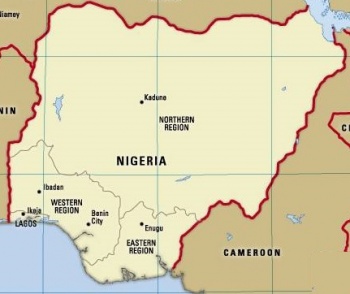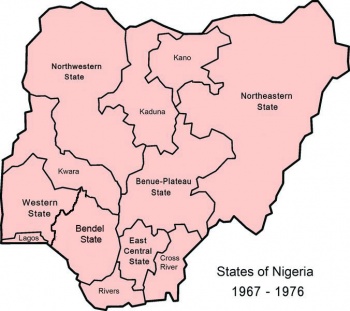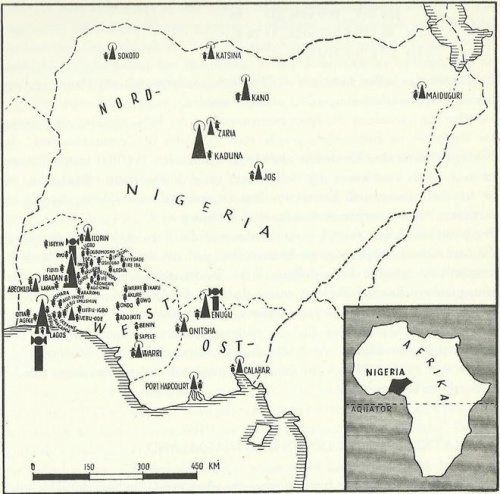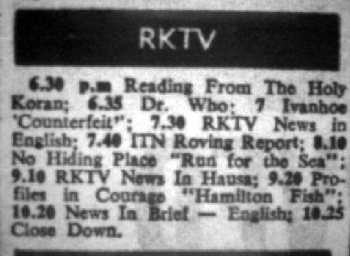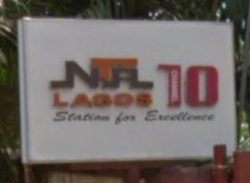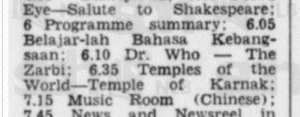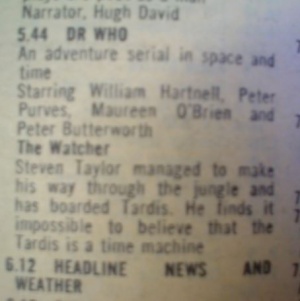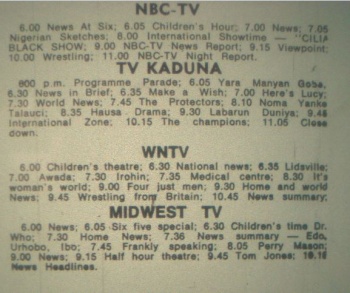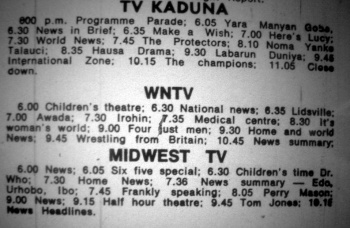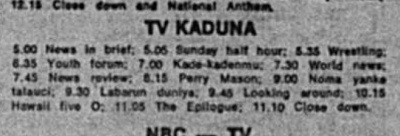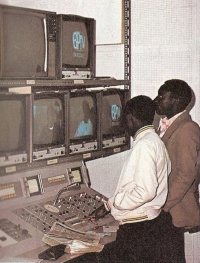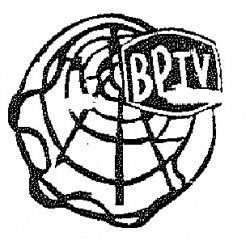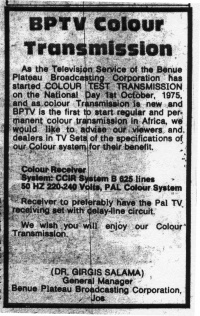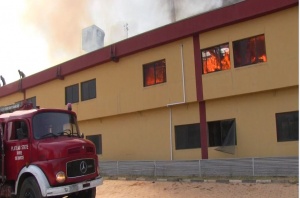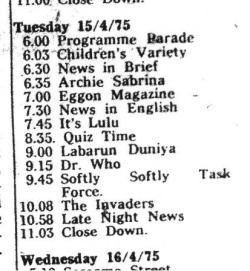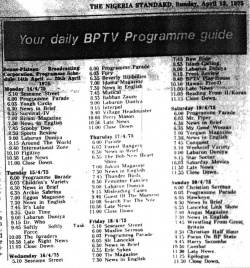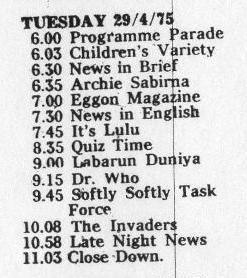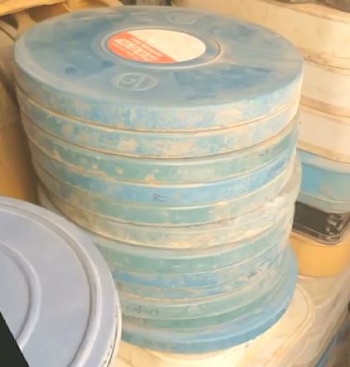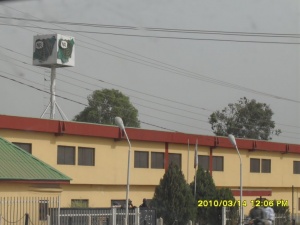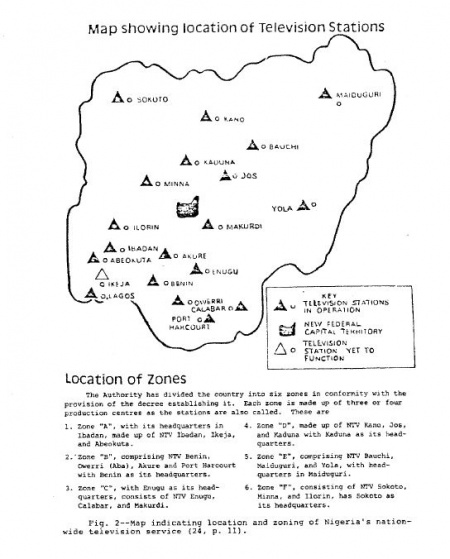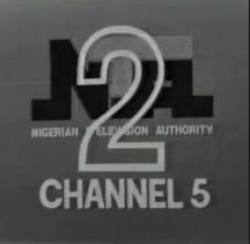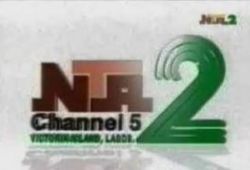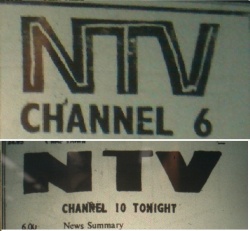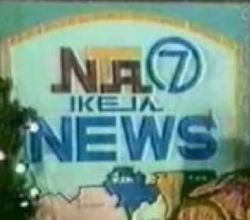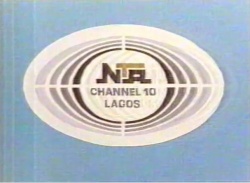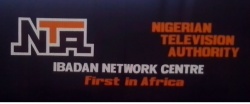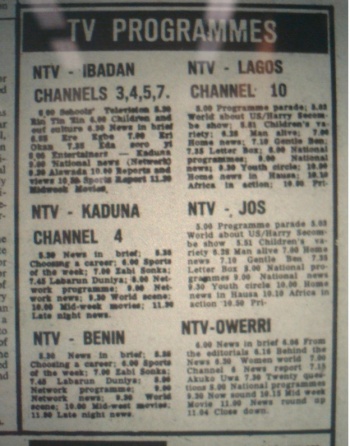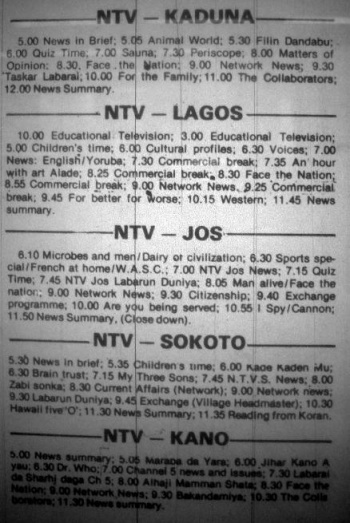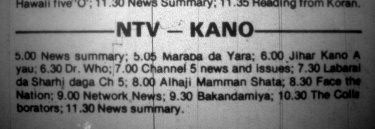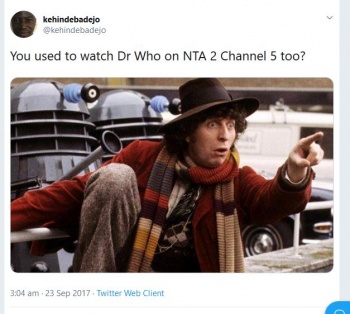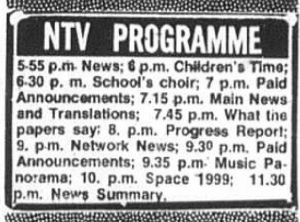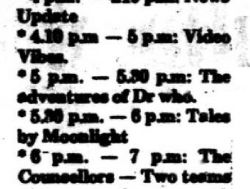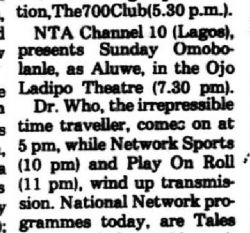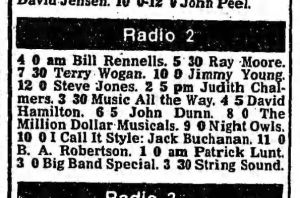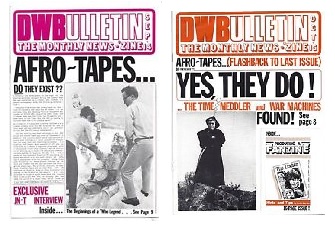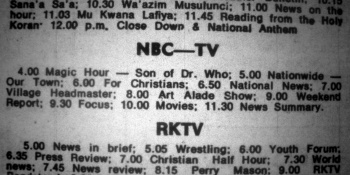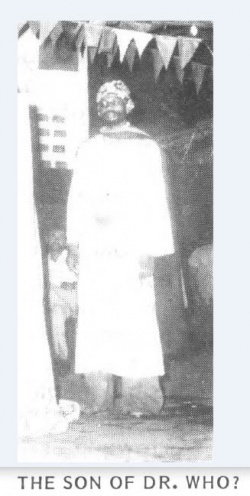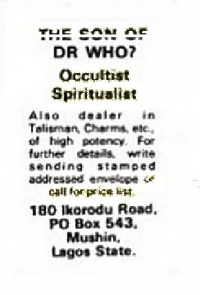Difference between revisions of "Nigeria"
Jon Preddle (talk | contribs) |
Jon Preddle (talk | contribs) |
||
| (3 intermediate revisions by the same user not shown) | |||
| Line 1: | Line 1: | ||
| − | '''[[Wikipedia:Nigeria|NIGERIA]]''' is in west [[:Category:Africa|Africa]]. | + | '''[[Wikipedia:Nigeria|NIGERIA]]''' is in west [[:Category:Africa|Africa]]. It became an independent nation on 1 October 1960. |
{{TOC right}} | {{TOC right}} | ||
==Profile== | ==Profile== | ||
| Line 27: | Line 27: | ||
|- | |- | ||
|} | |} | ||
| + | |||
| + | '''This section of the page displays best when the Table of Contents is put in 'hide' mode''' | ||
==Television Stations / Channels== | ==Television Stations / Channels== | ||
| − | [[File:NigeriaMap1967to1976.jpg|thumb|right|350px|The 12 States of Nigeria, 1967 to 1976]] | + | [[File:Nigeria1960.jpg|right|thumb|350px|Map of Nigerian states as they were from 1963 to 1967, when Doctor Who aired]] |
| + | [[File:NigeriaMap1967to1976.jpg|thumb|right|350px|The 12 States of Nigeria, as they were from 1967 to 1976 when Doctor Who aired]] | ||
| + | Nigeria is the most-populated country in Africa. The country was made up of four separate political Regions, each with its own capital city: '''Northern Nigeria''' (Kaduna), '''Eastern Nigeria''' (Enugu) and '''Western Nigeria''' (Ibadan). '''Lagos''', while in the south of the Western region was the Federal Capital. Nigeria achieved independence from Britain on 1 October 1960 (and was declared a republic in 1963). | ||
| − | Nigeria | + | The first television broadcasts in Nigeria had commenced the previous year: |
| − | + | *'''31 October 1959''': The '''Western Nigerian Government Broadcasting Corporation (WNBC)''' was based in Ibadan, and broadcast to the Western Region. Also known as '''WNTV''', it was the first television service operating in 'tropical' Africa. (North African countries such as [[Algeria]] and [[Libya]] (where [[Arabic]] was the principal language) had already established TV services a few years earlier.) (WNTV commenced colour broadcasts in 1975. It was later re-branded as '''NTV-Ibadan''' in 1976.) | |
| − | |||
| − | |||
| − | |||
| − | |||
| − | |||
| − | |||
| − | |||
| − | |||
| − | |||
| − | |||
| − | |||
| − | |||
| − | + | Three additional TV stations were established between '''1960 and 1962'''; two were owned by regional governments, while the third was owned by the Federal government in Lagos: | |
| − | * | + | *'''October 1960''': '''ENTV''', in Enugu in the '''Eastern Region''' |
| + | *'''15 March 1962''': '''RKTV''' in the '''Northern Region''' '''(#)''' | ||
| + | *'''1 April 1962''': '''NBC-TV''' in '''Lagos''' '''(#)''' | ||
| − | |||
| − | + | In '''1963''', Western Nigeria was split down the middle, with the eastern half renamed '''Mid-Western Region'''. A year later, the country's fifth TV station, the second in the Eastern Region, was established: | |
| + | *'''July 1964''': '''ENTV''' in Aba/Owerri in the '''Eastern Region''' | ||
| − | |||
| − | + | The two ENTV stations were destroyed in '''October 1967''' during the [[Wikipedia:Nigerian Civil War|Nigerian Civil War]]. After the conflict, the four Regions were divided into 12 new Military States (see 'pink' map). Four of these States later established their own television service during the 1970s: | |
| + | *'''April 1973''': '''MidWest TV / MTV''' in '''Bendel State''', which was the former Mid-Western Region '''(#)''' | ||
| + | *'''15 June 1974''': '''BPTV''' in Jos, in the '''Benue-Plateau State''' '''(#)''' | ||
| + | *'''September 1974''': the two destroyed '''ENTV''' stations in Enugu and Aba/Owerri were recommissioned and rebuilt during the next two years | ||
| + | *'''31 December 1974''': '''River State TV''' in Port Harcourt, in the '''Rivers State''' | ||
| + | *'''15 February 1975''': '''NWT''' in Sokoto, in the '''Northwestern State''' (formerly the western part of Northern Region) | ||
| − | |||
| − | * ''' | + | In '''February 1976''', the larger Regions were carved up into smaller States, creating seven new ones, bringing the total to 19. |
| + | *'''1976-1977''': the '''NTV''' network and '''NTA''' were established; all the Nigerian TV stations were reorganised into '''Zones''' '''(#)''' | ||
| − | |||
| − | + | Over the next decade further State television stations were set up. In '''1984''', educational TV by satellite was introduced. Later that year, several missing episodes of '''Doctor Who''' found in Nigeria were returned to the BBC. | |
| − | + | In '''September 1987''', the existing 19 States were divided up again, creating 21 political entities plus the new Federal Capital Territory of Abuja (created in '''1984'''). By '''August 1991''', there were 30. In '''October 1996''' (and remains so today) it was 36. | |
| − | Despite the country's large population, only the | + | And in each of these new States the NTA established a television service (see the more detailed list in the '''NTV/NTA''' section below). |
| + | *[[Wikipedia:States of Nigeria|The States of Nigeria]] | ||
| + | *[[Wikipedia:List of television stations in Nigeria|Television stations in Nigeria]] | ||
| + | |||
| + | Despite the country's large population, it was only the wealthy who could afford to own a television set in the early years, but bars and restaurants often had a set for the benefit of their customers. | ||
| + | |||
| + | Of the TV stations named above, the five marked '''(#)''' are known to have screened '''Doctor Who'''… | ||
{{clear}} | {{clear}} | ||
| Line 85: | Line 88: | ||
Although [[BBC Records]] identify sales of '''Doctor Who''' to the generic name of "Nigeria", these disparate sales were to different broadcasters across the country. | Although [[BBC Records]] identify sales of '''Doctor Who''' to the generic name of "Nigeria", these disparate sales were to different broadcasters across the country. | ||
| − | In some of the BBC records, Nigeria is identified by | + | In some of the BBC records, Nigeria is identified by Region: a memo from July 1965 states that the first 26 episodes had been sold and that the "books don't show anything for Northern N." and that "all details … [assumed] … are only for Lagos so far". |
| − | + | From this, it appears that by mid-1965 the first five serials only -- [[An Unearthly Child]] to [[The Keys of Marinus]] -- had been sold to the NBC in Lagos, but not to RKTV - and yet, RKTV is the only station on which the William Hartnell stories are known to have aired. From this, we can assume that either those five serial screened on more than one station, or the sales data actually refers only to RKTV and not to NBC. | |
| − | + | The '''Stanmark Productions Ltd''' advertisement from 1966, identifies Nigeria as one of '''sixteen''' countries screening '''Doctor Who''' by January 1966. | |
| − | + | In another BBC memo, this one dated August 1966, the series was noted as being sold to "Nigeria (N. & W.)". There were two TV stations in Western Nigeria: NBC in Lagos and WNTV in Ibadan. As before, it is possible that the sale to Nigeria was to more than one station as a combined deal, however '''Doctor Who''' only aired on RKTV. | |
Nigeria is named in the list of 27 countries in '''The Making of Doctor Who''' 1972 Piccolo edition. | Nigeria is named in the list of 27 countries in '''The Making of Doctor Who''' 1972 Piccolo edition. | ||
| Line 100: | Line 103: | ||
In '''The Eighties''' [http://www.shillpages.com/howe/b-dw80s.htm - THE LOST CHAPTERS], there are '''"(4)"''' sales noted for Nigeria prior to February 1987. Those likely equate to the four Tom Baker stories as noted in '''DWM''', although it appears that far more than only four [[Tom Baker stories]] aired. | In '''The Eighties''' [http://www.shillpages.com/howe/b-dw80s.htm - THE LOST CHAPTERS], there are '''"(4)"''' sales noted for Nigeria prior to February 1987. Those likely equate to the four Tom Baker stories as noted in '''DWM''', although it appears that far more than only four [[Tom Baker stories]] aired. | ||
| − | |||
| − | |||
| − | =''' | + | ='''TRANSMISSIONS BY REGION'''= |
=='''RKTV''' (1965-1967)== | =='''RKTV''' (1965-1967)== | ||
<span style="font-size:150%;">'''RADIO KADUNA TELEVISION'''</span> | <span style="font-size:150%;">'''RADIO KADUNA TELEVISION'''</span> | ||
| − | '''Radio-Television Kaduna / Radio Kaduna Television (RKTV)''' | + | '''Radio-Television Kaduna / Radio Kaduna Television (RKTV)''': commenced broadcasts in Northern Nigeria on '''15 March 1962''' from Kaduna. |
| − | ''' | + | It was operated by the Broadcasting Company of Northern Nigeria (BCNN), RKTV provided coverage to the '''Northern''' and largest region of Nigeria, with broadcasts out of Kaduna to nearby Jos, Zaria and Kano, and the distant northern cities of Katsuna, Sokoto, and Maiduguri via relay stations. |
| − | ===[[William Hartnell stories|WILLIAM HARTNELL]]=== | + | It's possible that some of these regions acquired the films at a later time via an internal bicycling system, which would give them separate sets of airdates (but no newspapers could be found to verify either way). |
| − | [[File: | + | |
| − | + | In 1967 (by which time '''Doctor Who''' had finished its run), the Region was divided into the North-Central, North-Western, North-Eastern, Kano, Kwara and Benue-Plateau States. | |
| + | |||
| + | RKTV was re-branded as '''NTV-Kaduna''' in 1976. (See also BPTV below.) | ||
| + | |||
| + | |||
| + | ==Stories bought and broadcast== | ||
| + | ===[[William Hartnell stories|WILLIAM HARTNELL]] (#1)=== | ||
| + | [[File:NigeriaMap63-67.jpg|right|thumb|500px|Northern Nigeria was the largest state, and was the region that received the 1965-67 RKTV broadcasts]] | ||
17 stories, 81 episodes: | 17 stories, 81 episodes: | ||
{| {{small-table}} | {| {{small-table}} | ||
| Line 165: | Line 173: | ||
===Transmission=== | ===Transmission=== | ||
| + | [[File:Nigeria RKTV.JPG|thumb|right|350px|RKTV; Generic listing 1965, Nigerian Daily Times]] | ||
| − | The series made its Nigerian debut on '''Radio-Television Kaduna / Radio Kaduna Television (RKTV)''', Tuesday, '''3 August 1965''', at 6.35pm. It stayed on that day of the week and timeslot throughout the run. | + | The series made its Nigerian debut on '''Radio-Television Kaduna / Radio Kaduna Television (RKTV)''', Tuesday, '''3 August 1965''', at 6.35pm. It stayed on that day of the week and timeslot throughout the entire run. |
In an article / interview with William Hartnell published in the '''24 April 1966''' issue of the UK newspaper, ''Daily Mirror'', it is noted that '''Doctor Who''' is "a knockout in Nigeria". | In an article / interview with William Hartnell published in the '''24 April 1966''' issue of the UK newspaper, ''Daily Mirror'', it is noted that '''Doctor Who''' is "a knockout in Nigeria". | ||
| − | + | On 1 October 1966, the sixth anniversary of the country's independence, the Northern Region was hit by a series of riots that lasted several weeks. Curfews were imposed on residents of Jos and Kaduna. There were power cuts and communication lines were severed. Radio and television broadcasts were also affected. | |
| − | + | The ''Daily Times'' stopped publishing TV schedules for RKTV from early October to late November 1966 (see our Airdates table). This would no doubt be on account of the riots disrupting broadcasts out of Kaduna. | |
| − | + | We assume that there were no TV broadcasts from RKTV at all during this time. If the stories aired in their correct order, then transmissions ceased after part 3 of [[The Web Planet]] on '''27 September''', and didn't resume with part 4 until two months later, on '''29 November'''. | |
| + | The last clear listing for '''Doctor Who''' on RKTV was on '''18 April 1967'''. | ||
| + | |||
| + | This is a spread of 90 weeks, and with there being 81 episodes of '''Doctor Who''', there is an imbalance of nine dates. The eight week period when there were riots accounts for most of these 'pre-emptions', and there were also no TV listings in the 28 June 1966 issue, so this might account for the ninth. | ||
| + | |||
| + | Later in the year, the State was divided into six smaller states, of which one was Benue-Plateau… | ||
====*Fate of the Prints?==== | ====*Fate of the Prints?==== | ||
| − | + | If, as is noted above, there were indeed subsequent regional screenings of the same episodes elsewhere in Northern Nigeria, the episodes may have been sent to the other transmission stations. Jos was one of the closest, so it's possible the films went there, then on to other relay stations. And maybe ended up on a shelf somewhere… | |
| − | If, | + | If there wasn't internal bicycling, it is very possible that RKTV forwarded its prints of the first 26 episodes / five [[William Hartnell stories]] to [[Ghana]]. |
| − | The first eleven serials (up to [[The Rescue]], may have gone to [[Kenya]]. | + | The first eleven serials (up to [[The Rescue]]), may have gone to [[Kenya]]. |
| − | + | Alternatively, the other Nigerian episodes were subsequently forwarded directly to [[Sierra Leone]], who commenced screening the series only a month after Nigeria had aired the final episode of [[The Time Meddler]]. | |
| − | + | It has been reported that a TV station in Nigeria had contacted the BBC (by phone or by fax) in '''1997''' to inform they had a set of black and white episodes of '''Doctor Who''', and that after determining that they were from the first two seasons, the BBC staff member told them they were not required and that they could be destroyed! For the prints to still be in Nigeria as late as that, it could only be if those films had not been bicycled to another country, and had been retained by one of the remote relays since 1967… | |
| + | |||
| + | One needs to also keep in mind that only 14 films were found by the NTA in the mid-1980s (see section on MidWest TV below), so one has to wonder why these 81 Season 1 and 2 episodes weren't also recovered at that time. | ||
| + | |||
| + | One possible solution is that the films had come from another broadcaster and had somehow ended up at the NTA (it's important to take into account that RKTV no longer existed in 1997, and it would have likely been the NTA (see below) that phoned the BBC). If the films had come from another country in Africa, there are only a few possibilities. | ||
| + | |||
| + | Maybe the films were sent to Nigeria because that was where they had originated from - it was the station at the end of that particular bicycling chain who had returned them to their point of origin (a cheaper option than sending them to England?!). | ||
| + | |||
| + | Keep in mind too that four countries in North Africa used prints that had been dubbed into [[Arabic]], so it's possible this set of films had come from that region and were ordered to be destroyed because they were of little use being in a foreign language - and if so, the set would not have included any missing episodes, such as [[Marco Polo]], [[The Reign of Terror]] or [[The Crusade]]. | ||
===TV Listings=== | ===TV Listings=== | ||
| + | {{airdates-left|}} | ||
| + | |||
The listings for RKTV have been obtained from the Lagos newspaper, ''Daily Times''. | The listings for RKTV have been obtained from the Lagos newspaper, ''Daily Times''. | ||
All billings identify the series as '''"Dr Who"'''. | All billings identify the series as '''"Dr Who"'''. | ||
| − | Several issues did not contain listings for RKTV, and some had no TV listings at all. | + | Several issues did not contain listings for RKTV, and some had no TV listings at all. There were no RKTV listings in October and November 1966, which would be due to the riots and curfews. |
| + | |||
| + | Newspapers could not be accessed for Katsuna, Sokoto, or Maiduguri, so it's not known if there were regional screenings in those three locations. | ||
---- | ---- | ||
| + | =='''PATRICK TROUGHTON IN NIGERIA'''== | ||
| + | |||
| + | Because of limited TV listings in Nigerian newspapers for the 1973 to 1976 period, it has been very difficult to document when and where the second Doctor stories screened. Only a handful of '''"Dr Who"''' listings for BPTV in 1975 (below) have been found, and there isn't much available online, so a lot of guess work has been needed to compile the next part of the '''Doctor Who in Nigeria''' profile. | ||
| + | |||
| + | According to BBC sales documentation, only six Troughton serials were sold to Nigeria, all during the period 1974 to 1976. And it is clear that these sales were done to use up the quota for minor-Commonwealth countries that expired '''seven years''' after the initial UK broadcasts -- i.e. when the BBC sold programmes to Commonwealth countries with large television viewership at a premium charge, it paid a fee to Equity which included that sale plus the next sale to a minor-Commonwealth country, one with a much smaller viewership. And since the royalty for both sales was paid in advance, the BBC had to recoup the advance portion of this expense before the rights expired, something they usually achieved within a very close timeframe. But sometimes they were not able to achieve that last sale until very close to the expiry date. | ||
| + | |||
| + | After a TV station had agreed to purchase a programme, the BBC issued an invoice, and advised its Clearances departments to make the relevant royalties payments; the dates on which the invoices were issued are not recorded, but the date the Clearances departments were notified is, and these are sometimes recorded ''after'' the sales rights period had already lapsed. | ||
| + | |||
| + | Most of the Clearances paperwork still exists, and extracts from them have been published in ''Doctor Who Magazine'' (issue 444 and 445, in 2012), and in Richard Molesworth's book ''Wiped!'' (Telos). | ||
| + | |||
| + | |||
| + | '''SALES RIGHTS''' | ||
| + | |||
| + | We've included the final three William Hartnell stories sold to Nigeria in this table (sequenced by Invoice number) as they have a bearing on now the sales were recorded. | ||
| + | |||
| + | {| {{small-table}} | ||
| + | |||Invoice||Clearances||Rights Expired | ||
| + | |- | ||
| + | |[[The Time Meddler]]||TE/02050||25 May 73||Jul 75 | ||
| + | |- | ||
| + | |[[The Web Planet]]||TE/02050||25 Jul 73||Feb 75 | ||
| + | |- | ||
| + | |[[The War Machines]]||TE/02508||10 Jul 73||Jun 73 | ||
| + | |- | ||
| + | |[[The Abominable Snowmen]]||TE/08711||24 Oct 74||Sep 74 | ||
| + | |- | ||
| + | |[[The Enemy of the World]]||TE/08711||24 Oct 74||Dec 74 | ||
| + | |- | ||
| + | |[[The Web of Fear]]||TE/08711||24 Oct 74||Feb 75 | ||
| + | |- | ||
| + | |[[The Wheel in Space]]||n/k||n/k||Apr 75 | ||
| + | |- | ||
| + | |[[The Dominators]]||TE/14563||20 Nov 75||Aug 75 | ||
| + | |- | ||
| + | |[[The Krotons]]||TE/15070||6 Feb 76||Dec 75 | ||
| + | |- | ||
| + | |} | ||
| + | |||
| + | The date for [[The Time Meddler]] is a bit confusing; on the clearances paperwork the original date 25/5/73 has been altered to 25/'''7'''/73; but the month of 'May' would be correct for placing the invoice number TE/02050 ahead of invoice number TE/02508 which had clearances paid a few days earlier on July, so we've used May 1973 as the 'correct' date. | ||
| + | |||
| + | The three Season five serials all have the same invoice number (TE/08711) and clearances date (24 October 1974), which suggests they were all sold together as a single sales "package". But was [[The Wheel in Space]] part of that same package? | ||
| + | |||
| + | The relevant clearances info for [[The Wheel in Space]] is unfortunately missing, so we don't actually know when it was sold to Nigeria. Was it sold in late 1974 along with the three other Season five stories? Or was it sold in 1975 with [[The Dominators]]? Or was it sold on its own on some other date? Maybe even in 1973 with the three William Hartnell stories? | ||
| + | |||
| + | Logic dictates that it was in 1974 as part of a 24-episode package of season five serials to use up the minor-Commonwealth quota (seven years from UK broadcast) that expired that same year. | ||
| + | |||
| + | '''But that is still only an assumption - and a new alternative has presented itself'''. | ||
| + | |||
| + | Other available sales data suggests that the sales rights for this serial actually expired '''a year earlier'''. And if so, that could also bring its Nigerian screening date forward by a year. | ||
| + | |||
| + | The [[New Zealand|NZBC]] film traffic records that still exist today record the rights "EXP" date for all the season five Troughtons: [[The Tomb of the Cybermen]] has '''31 July 1973''', [[The Abominable Snowmen]] is '''31 August 1973''', [[The Enemy of the World]] and [[The Web of Fear]] both expired on '''31 March 1974'''. But the "EXP" date for [[The Wheel in Space]] is '''31 May 1973'''. It is ''possible'' this is nothing more than an admin error, and it should be May ''1974''. | ||
| + | |||
| + | BUT - what if it's not an error? WHAT IF the sales rights for that serial ''did'' in fact expire in '''May 1973'''? That would certainly exclude it from being sold to Nigeria with the other season five stories in 1974. But why would the 6-part Cyberman tale have a shorter sales right period? | ||
| + | |||
| + | We know that [[The Wheel in Space]] wasn't part of the consignment of episodes that the ABC sent back to the BBC in mid-1975. Was this because they had already destroyed the prints once the rights had expired in 1973? | ||
| + | |||
| + | Why 1973? The answer may lie in the fact that the closing moments of the serial featured clips from [[The Evil of the Daleks]]. By the end of 1968, Terry Nation had only just lifted a foreign sales embargo which had prevented the BBC from selling Dalek stories overseas during 1966 and 1967. While all the other Troughton serials had a seven year period, [[The Wheel in Space]] (which screened in April 1968) may have had only a '''five year''' window, bringing the rights expiry to April 1973, which certainly ties in with the NZ rights expiry date. | ||
| + | |||
| + | The rights on [[The Power of the Daleks]] would have expired in 1971/72 (hence the ''final'' sale of that story was to [[Singapore]] in 1972, and those on [[The Evil of the Daleks]] expired in 1972, the final sale of that being to [[New Zealand]] in mid-1970. | ||
| + | |||
| + | Of note, [[The Tomb of the Cybermen]] and [[Fury from the Deep]] also weren't sold after 1970. If the restriction on Daleks extended to their being named in the dialogue -- Victoria mentions the Daleks in part three of "Tomb" and part four of "Fury" -- that could explain why the two Deborah Watling serials weren't sold to [[Zambia]] in 1973 - the rights were only five years from the UK dates: September 1972 and March 1973 respectively. (The final sale of "Tomb" had been to [[New Zealand]] in 1970, and the final sale of "Fury" and "Wheel" was to [[Gibraltar]], with clearances paid for [[Fury from the Deep]] on 19 April 1973.) | ||
| + | |||
| + | So, if the foreign sales rights on [[The Wheel in Space]] actually expired by April 1973, this means the window for when the BBC had to make a final sale to complete the minor-Commonwealth quota is brought forward. If we re-order the "expired" dates to accommodate this scenario, the '''new revised table''' looks like this: | ||
| + | |||
| + | {| {{small-table}} | ||
| + | |||Invoice||Clearances||Rights Expired | ||
| + | |- | ||
| + | |[[The Time Meddler]]||TE/02050||25 May 73||Jul 75 | ||
| + | |- | ||
| + | |[[The Web Planet]]||TE/02050||25 Jul 73||Feb 75 | ||
| + | |- | ||
| + | |[[The Wheel in Space]]||n/k||(Jul 73?)||'''Apr 73''' | ||
| + | |- | ||
| + | |[[The War Machines]]||TE/02508||10 Jul 73||Jun 73 | ||
| + | |- | ||
| + | |[[The Abominable Snowmen]]||TE/08711||24 Oct 74||Sep 74 | ||
| + | |- | ||
| + | |[[The Enemy of the World]]||TE/08711||24 Oct 74||Dec 74 | ||
| + | |- | ||
| + | |[[The Web of Fear]]||TE/08711||24 Oct 74||Feb 75 | ||
| + | |- | ||
| + | |[[The Dominators]]||TE/14563||20 Nov 75||Aug 75 | ||
| + | |- | ||
| + | |[[The Krotons]]||TE/15070||6 Feb 76||Dec 75 | ||
| + | |- | ||
| + | |} | ||
| + | |||
| + | What this could mean is that the Nigerian purchase of [[The Wheel in Space]] may have taken place much earlier than first thought, and perhaps even at the '''same time''' as the sale of the 14 Hartnell episodes in '''1973'''. What if the missing invoice number was TE/02508, the same as the one for [[The War Machines]]? | ||
| + | |||
| + | |||
| + | '''BUT WHAT STATION WAS IT?''' | ||
| + | |||
| + | We know that some episodes aired on '''MidWest''' station in Bendel State - see below. | ||
| + | |||
| + | Episode-hunter Phil Morris said at a public event in August 2016 that [[The Wheel in Space]] was sold to the '''NBC in Lagos'''. If this was so, then it's possible that [[The Web Planet]] and [[The Time Meddler]] was one batch that was sold to MidWest, while [[The Wheel in Space]] along with [[The War Machines]] was a separate batch that was sold to NBC. | ||
| + | |||
| + | Of course, this does beg the painful question of why wasn't [[The Wheel in Space]] found in 1984 along with the other three Hartnells? | ||
| + | |||
| + | One possible answer to that is the six film prints were ''borrowed'' from [[Gibraltar]], where the run of the season five stories was due to screen later that year: WHAT IF the BBC or the GBC sent [[The Wheel in Space]] to Nigeria in early 1973, the story aired along with the three Hartnells, and the films were sent (back) to [[Gibraltar]] in time for screening there in October. | ||
| + | |||
| + | Of course, this may be '''totally wrong''' (!), but we feel sure that after much careful analysis, a 1973 screening for [[The Wheel in Space]] actually makes quite a lot of sense given all the anomalies surrounding other sales and the Nigerian screenings. | ||
| + | |||
| + | On this basis, we will work under the belief that [[The Wheel in Space]] aired in 1973. | ||
| + | |||
| + | |||
| + | ---- | ||
| + | |||
| + | =='''NBC-TV''' (1973)?== | ||
=='''MIDWEST TV''' (1973)== | =='''MIDWEST TV''' (1973)== | ||
| − | |||
| + | This run of stories aired all on the same station, or split over two. | ||
| − | ''' | + | '''NBC-TV''' |
| + | [[File:NTA10Lagos.JPG|right|thumb|250px|NTA Lagos Channel 10 as it is today]] | ||
| − | ===[[William Hartnell stories|WILLIAM HARTNELL]] ( | + | The '''Nigerian Television Service (NTS)''' was owned by the Federal government, and was Nigeria's fourth TV station; it was launched on '''1 April 1962''' from the then-capital city of Lagos. (It was created with the assistance of '''[[TIE Ltd|Television International Enterprises Ltd]]'''.) |
| + | |||
| + | The station was relocated to Victoria Island in 1963, ultimately transmitting to the entire western region on channel 10. By 1969 it had been renamed the '''Nigerian Broadcasting Corporation (NBC)'''. | ||
| + | |||
| + | It was later re-branded as '''NTV-Lagos''' Channel 10. | ||
| + | |||
| + | |||
| + | '''MIDWEST TV''' | ||
| + | |||
| + | The Mid-Western Region was created in 1963 when Western Nigeria was split down the middle. The region was renamed Bendel State in 1967. | ||
| + | |||
| + | The military government of Bendel established a TV service called '''MidWest Television''' in '''April 1973'''. It broadcast from the state capital Benin City to the southern regions of the country. It was also known as '''MTV''' and '''Bendel TV'''. | ||
| + | |||
| + | It was re-branded as '''NTV-Benin''' Channel 7 in 1976. | ||
| + | |||
| + | {{clear}} | ||
| + | |||
| + | ==Stories bought and broadcast== | ||
| + | ===[[William Hartnell stories|WILLIAM HARTNELL]] (#2)=== | ||
| + | ===[[Patrick Troughton stories|PATRICK TROUGHTON]] (#1)=== | ||
| + | |||
| + | Four stories, 20 episodes: | ||
| − | |||
{| {{small-table}} | {| {{small-table}} | ||
|- | |- | ||
| Line 218: | Line 373: | ||
|- | |- | ||
|BB||[[The War Machines]]||4 | |BB||[[The War Machines]]||4 | ||
| + | |- | ||
| + | |SS||[[The Wheel in Space]]||6 | ||
|- | |- | ||
|} | |} | ||
| − | + | '''As noted above, it's not clear if these four stories aired on the same TV station, or on two different stations.''' | |
| − | + | BBC Records indicate that by the early 1970s, the sales rights on three William Hartnell stories and one Patrick Troughton serial were due to expire, with at least two of them in 1973. Two of these were ones that had previously screened on RKTV in 1966 and 1967. | |
| + | |||
| + | Although this selection of stories does appear to be rather random, in all cases there was still a minor-Commonwealth "quota" sale available, so the BBC would have offered these four as a special package deal before the sales rights expired in 1973. | ||
| + | For instance, [[The Time Meddler]] was not sold to [[Ethiopia]] and [[The Gunfighters]] had not been sold to [[New Zealand]], so one more sale of each was available under the minor-Commonwealth "quota". But why didn't Nigeria get [[The Gunfighters]]? | ||
| − | ''' | + | Serial {{Z}} ''should'' have been part of this Nigerian package, but presumably its rights had already expired by the time the deal was made (seven years after the serial had screened in the UK, which takes it to April 1973), or maybe -- and perhaps more importantly -- there were no longer any films prints available, so the BBC just selected the next 4-parter that did have a full set of prints - and that was [[The War Machines]]… |
| − | + | It's possible that other season three 4-parters were considered for this "Nigerian package", but a variety of factors would have to be taken into account -- such as whether or not the rights were still open, would payment need to be made for music clearances ([[The War Machines]] may have been 'cheaper' because it used stock music only), and the films were available to send at possible short notice. | |
| − | + | Both [[The Web Planet]] and [[The Wheel in Space]] had been sold to [[New Zealand]], but the former did not screen, so there was still an outstanding minor-Commonwealth sale to be cleared. | |
| − | + | With MidWest, the BBC probably offered the brand new station these expiring episodes of '''Doctor Who''' for the very fact that it was new -- as it would have been looking for some ''very cheap'' programming in its first month of operation, April 1973. (Since this was a direct offer, the TV station would not have needed to audition them first.) And a batch of old programmes coming to the end of their sales rights period would have been quite a bargain. | |
| − | + | A new TV station due to start transmitting in April 1973, and a batch of TV episodes due to expire that very same month - it's too much of a coincidence that these dates should be the same. | |
| − | |||
| − | |||
| − | |||
| − | + | The BBC's records have both [[The Web Planet]] and [[The Time Meddler]] being sold to "Nigeria" under the same invoice number (02050). The corresponding clearance royalties paid out on 25 July 1973, whereas the sale for [[The War Machines]] had royalties paid out two weeks earlier, by 10 July 1973, but with a sequentially later invoice number (02508). | |
| − | + | But as noted in the tables above, the '''25/7/73''' date for [[The Time Meddler]] was originally '''25/5/73''', which means the original invoices were issued a few months earlier. | |
| + | And as noted above, it is ''possible'' that these two invoice numbers actually means the four stories were sold in two packages - one went to MidWest, the other to NBC. | ||
| + | |||
| + | The programme was supplied as 16mm black and white film prints with English soundtracks. | ||
====*Origin of the Prints?==== | ====*Origin of the Prints?==== | ||
| + | [[File:RTSZarbi1966.JPG|right|thumb|300px|The Web Planet part 2 (The Zarbi) on Singapore TV, 16 July 1966; did these films go to Nigeria?]] | ||
| + | [[File:DWNZWatcher.JPG|right|thumb|300px|Listing for The Time Meddler part 1, New Zealand Listener, November 1968. Five years later, the films were sent to Nigeria…]] | ||
| + | |||
| + | It is not known where the copy of [[The Web Planet]] came from. The returned film prints still had the original BBC countdown clock leaders on them; since these are ''usually'' (but note, not always) removed by a broadcaster, it's possible that the prints were a fresh set sent by the BBC. Alternatively, the films were bicycled from a previous broadcaster. | ||
| + | |||
| + | Although it had been purchased and rights paid out, the serial did not screen in [[New Zealand]] due to censorship, and the fate of the film prints held by the NZBC was not recorded, but it is possible that [[The Web Planet]] was sent to Nigeria at the same time as [[The Time Meddler]]. Or, since the ex-[[Singapore]] prints of [[The War Machines]] were sent to Nigeria, the RTS may have also been responsible for supplying [[The Web Planet]]. | ||
| − | + | Another possible source for these six films was [[Ethiopia]], the previous African nation to have aired the story (in November 1971). | |
| − | + | The film prints for [[The Time Meddler]] were sent to Nigeria from [[New Zealand]] on '''2 March 1973''', which was only a month ahead of the MidWest transmissions. | |
| − | + | These episodes had been cut by the New Zealand censors. (The first few minutes of the opening TARDIS control room scene, which had the first onscreen appearance of Steven Taylor, was also removed -- but it's not known whether this was done by the NZBC or by MidWest.) | |
| − | + | The prints of [[The War Machines]] that were supplied to Nigeria came via [[Singapore]]. [[Singapore]] had in turn received the prints from [[New Zealand]]; they had been dispatched by the NZBC on '''10 January 1972'''. The prints had been cut by the New Zealand censors; although it appears that the Nigerian station or the [[Singapore]] broadcaster had made further cuts to episodes two and three. | |
| − | + | [[The Wheel in Space]] films, as noted above, were ''possibly'' "borrowed" from [[Gibraltar]]; the episodes would have been sent there by the BBC or via [[Singapore]] in early 1973, but since they were not due to air until later in the year, there was plenty of time for them to be sent to, screened in, and returned by the station in Nigeria. | |
| − | + | And the small fact that those six films weren't found with the other Hartnell episodes in 1984 or returned from Jos with the other season five Troughton serials in 2013 indicates that the episodes were likely already disposed of by then. | |
| − | + | The fact that nearby [[Sierra Leone]], where all the available season one, two and three Hartnell serials (including [[The Web Planet]], [[The Time Meddler]] and [[The War Machines]]) were still held, '''didn't''' supply those three to Nigeria does raise the question as to why that was. One likely answer is that since [[Sierra Leone]] possessed a complete run of stories, the BBC didn't want that set broken up, as it may have planned to make further block sales in Africa. (As it transpired, no further sales did eventuate, and [[Sierra Leone]] eventually returned all the prints to London in 1974.) | |
| − | + | '''Summary''': | |
| + | *[[The Web Planet]] -- from the BBC? or maybe [[New Zealand]]? | ||
| + | *[[The Time Meddler]] -- from [[New Zealand]] (sent in March 1973) | ||
| + | *[[The War Machines]] -- from [[Singapore]], who got from [[New Zealand]] in 1972 | ||
| + | *[[The Wheel in Space]] -- borrowed from [[Gibraltar]] | ||
===Transmission=== | ===Transmission=== | ||
| − | [[File:Nigeria MID.JPG|thumb|right|350px|MidWest TV: | + | [[File:NigeriaTv1973.JPG|thumb|right|350px|Generic April 1973 listing from New Nigerian with both NBC-TV (Children's Hour) and MidWest TV (Children's Time)]] |
| + | [[File:Nigeria MID.JPG|thumb|right|350px|MidWest TV: "Children's Time Dr Who", April 1973, New Nigerian]] | ||
| − | + | TV schedules in the ''New Nigerian'' have listings for '''NBC-TV''', '''TV KADUNA''' (aka RKTV), '''WNTV''' and '''MIDWEST TV'''. | |
| − | + | If '''Doctor Who''' aired on NBC, there were no specific billings for it, only a generic '''"Children's Hour"''' from 6.05 to 7pm on weekdays (see clipping at right). | |
| − | + | However, under '''MIDWEST TV''', the listings are more specific. The brand new station had commenced broadcasts in mid '''April 1973''', and the first TV listings appear in the 24 April 1973 issue of the local newspapers. | |
| − | + | The first billing for '''Doctor Who''' appears on Monday, '''30 April 1973''', and is given as '''"Children's time Dr. Who"'''; the timeslot is from 6.30 to 7.30pm. '''"Children's Time"''' also aired on Wednesdays and Fridays, but with the shorter timeslot of 6.30pm to 7.00pm. | |
| − | + | As noted above, the prints of [[The Time Meddler]] were sent from [[New Zealand]] on '''2 March 1973''', and would have arrived before the station went to air. The other 16 would have arrived around that same time. | |
| − | + | It's not clear from these listings if '''Children's Time''' was a separate programme, with '''Dr Who''' screening after it, or if the Monday segment was actually '''Doctor Who''' for the full hour. That the Monday timeslot being an hour as opposed to half an hour at it was on the other two days of the week does offer the strong possibility that two episodes aired back-to-back. | |
| − | |||
| − | |||
| − | + | If two episodes aired each week, they did so without being edited together - i.e. there was no reports of evidence of such cuts or splices in the recovered film prints. (There ''were'' unusual edits made to the cliffhanger of part 2 and recap in part 3 of [[The War Machines]], which ''might'' indicate they had been spliced together in error, but one would expect parts 1 and 2, and 3 and 4 to be combined, not the middle two episodes.) | |
| − | + | Four newspapers from this period were missing - 7 May, and 11, 18, 25 June - so we assume they each would have the same billings as the issues before and after. | |
| + | |||
| + | The last listing for '''"Children's time Dr Who"''' is on '''2 July 1973'''. From the following Monday '''Doctor Who''' was replaced by the Hanna-Barbera cartoon '''[[Wikipedia:The Flintstones|The Flintstones]]'''. Since that was a half-hour show, that does indeed suggest that '''Doctor Who''' only occupied a half hour. | ||
| + | |||
| + | That date range is a spread of '''ten weeks'''. Depending on the content of the hour, these ten listings are either the full package of 20 episodes sold, two per night back to back, or it's only ten - a 6-parter and a 4-parter. The 6-parter was likely [[The Web Planet]], if [[The Wheel in Space]] was screened on NBC. | ||
| + | [[File:DWM95News.JPG|thumb|right|350px|The discovery of The Time Meddler and The War Machines in Nigeria was announced in DWM95 (Dec 1984)]] | ||
| + | |||
| + | If 10 of these episodes did air on NBC, there were no listings other than the generic '''"Children's Hour"''' as an indicator that something that could have been '''Doctor Who''' had been shown on that channel in mid-1973. | ||
| + | |||
| + | But at a guess, if MidWest didn't screen four stories but only two, we think the ones they did air were [[The Web Planet]] and [[The Time Meddler]], while [[The War Machines]] and [[The Wheel in Space]] would have been the ones to show on NBC. | ||
| + | |||
| + | |||
| + | '''Conclusion: NBC or MIDWEST?''' | ||
| + | |||
| + | On balance, since we have no clear listings on NBC, but we do have a clear run of TV listings for '''"Children's time Dr Who"''' on '''MidWest''' that comfortably supports 20 episodes shown back to back over ten weeks, and that 14 of these were later found together in 1984, we feel sure that '''ALL''' 20 episodes in the "package" were sold to and screened by '''MidWest''' in Bendel State to use up the "Commonwealth" rights expiring by mid-1973. | ||
| + | |||
| + | The order in which the stories were shown is unknown: it may even have been alphabetical by story code: {{BB}}, {{N}}, {{S}}, {{SS}}. | ||
====*Fate of the Prints==== | ====*Fate of the Prints==== | ||
| − | It was a passing comment on a | + | It was a passing comment on a BBC Radio 2 programme in early 1984 (probably '''Terry Wogan''''s week-day morning programme - see below) that Nigerian television was so far behind the times that Patrick Troughton was still the Doctor over there that prompted Ian Levine and the BBC to contact the NTA in Nigeria in the search for missing episodes. This contact resulted in the discovery in mid-1984 of [[The Web Planet]], [[The Time Meddler]] and [[The War Machines]]. |
| − | + | Presumably all were found together at the same place - which was likely to be '''NTV-Benin'''. (One does wonder why the person Levine contacted didn't check other places, such as Jos!) | |
| − | + | After a considerable delay, all 14 of these Hartnell episodes were subsequently delivered to the BBC in early 1985. | |
| − | + | Episode one of [[The Time Meddler]] was missing parts of the opening TARDIS scene. This may have been cut in [[New Zealand]] because [[The Chase]] did not screen, and viewers may have wondered who Steven was. Or did the Nigerian station cut the scene for similar or other reasons (timings, perhaps)? | |
| − | The recovered prints of [[The War Machines]] exhibited the cuts made by the New Zealand censor, as well as additional cuts to parts two and three, which were made by [[Singapore]] or the Nigerian station | + | The recovered prints of [[The War Machines]] exhibited the cuts made by the New Zealand censor, as well as additional cuts to parts two and three, which were made by [[Singapore]] or the Nigerian station. |
The BBC already held copies of [[The Web Planet]]: a set of uncut negatives plus a set of prints, which were incomplete (part one was missing the opening recap from [[The Romans]] and part six had an alternative "NEXT EPISODE" closing caption). The returned "Nigerian" prints were complete and uncut. | The BBC already held copies of [[The Web Planet]]: a set of uncut negatives plus a set of prints, which were incomplete (part one was missing the opening recap from [[The Romans]] and part six had an alternative "NEXT EPISODE" closing caption). The returned "Nigerian" prints were complete and uncut. | ||
| + | |||
| + | [[The Wheel in Space]] wasn't held with the others, because - as we've suggested above - the films had been sent (back) to [[Gibraltar]] in time for its screening there in October. | ||
===TV Listings=== | ===TV Listings=== | ||
| + | {{airdates-left|}} | ||
| − | + | The ''New Nigerian'' from Kaduna had listing schedules for four TV stations - '''NBC-TV''', '''WNTV''', '''MIDWEST TV''' and '''TV KADUNA / RKTV'''. | |
| − | The six | + | The paper started publishing listings for MidWest from Tuesday, 24 April 1973, soon after the new station commenced transmissions. The first listing for '''Dr Who''' is dated '''30 April 1973'''. There were no papers available for 7 May or the last three weeks of June 1973, but the surviving six airdates billed the hour-long timeslot as '''"Children's time Dr Who"'''. |
| − | + | From July 1973, ''New Nigerian'' only occasionally published further MidWest TV listings. | |
| − | + | There were no billings for '''Doctor Who''' for NBC in the paper, only the generic '''"Children's Hour"''' in weekday early evenings, a slot which may or may not have included '''Doctor Who'''. | |
| + | |||
| + | It's worth noting that six years later, the newspapers published in Benin City in 1979 still had '''"Children's Time"''' screening in an early evening timeslot. | ||
---- | ---- | ||
| − | ==''' | + | =='''RKTV''' (1974)== |
| − | <span style="font-size:150%;">''' | + | <span style="font-size:150%;">'''RADIO KADUNA TELEVISION'''</span> |
| + | |||
| + | Seven years after the [[William Hartnell stories]] had screened there, '''Doctor Who''' was (apparently) back on RKTV in 1974. | ||
| + | |||
| + | In late 1967, the large Region that had previously been Northern Nigeria had been carved up into six smaller States: '''Northwestern''', '''Kano''', '''Northeastern''', '''Kwara''', '''Benue-Plateau''' and '''Kaduna''' (see Pink map above). | ||
| + | |||
| + | RKTV still broadcast from Kaduna to Zaria (also in Kaduna State), Jos (in Benue-Plateau), Kano and Katsuna (in Kano State), Sokoto (in Northwestern), and Maiduguri (Northeastern). Of these States, only Benue-Plateau had its own TV station - BPTV, which was launched in June 1974. | ||
| + | |||
| + | |||
| + | ==Stories bought and broadcast== | ||
| + | ===[[Patrick Troughton stories|PATRICK TROUGHTON]] (#2)=== | ||
| + | [[File:QQ4can.jpg|thumb|right|250px|Web of Fear ep 4 film can, showing RTV [[Hong Kong]] label]] | ||
| + | Three stories, 18 episodes: | ||
| + | |||
| + | {| {{small-table}} | ||
| + | |- | ||
| + | |NN||[[The Abominable Snowmen]]||6 | ||
| + | |- | ||
| + | |PP||[[The Enemy of the World]]||6 | ||
| + | |- | ||
| + | |QQ||[[The Web of Fear]]||6 | ||
| + | |- | ||
| + | |} | ||
| + | |||
| + | According to Phil Morris, these three stories were sold to RKTV. This must have preceded the screenings on BPTV - see below. | ||
| + | |||
| + | This sale of three season five stories to Nigeria was directly linked to the sale to [[New Zealand]] under the minor-Commonwealth "quota" -- i.e. the Nigerian TV station could only purchase the same serials that the NZBC had in 1971, which is why the two season five serials not acquired by NZ -- [[The Ice Warriors]] and [[Fury from the Deep]] -- were also not offered to Nigeria. And with the sales rights to the serials expiring in late 1974, there was a need to get a final minor Commonwealth sale completed before they were withdrawn. | ||
| + | |||
| + | The minor Commonwealth rights on [[The Wheel in Space]] had been completed with the sale in 1973 (see above), so only these three Troughton stories needed to be sold before the end of 1975. | ||
| + | |||
| + | The programme was supplied as 16mm black and white film prints with English soundtracks. | ||
| + | |||
| + | ====*Origin of the Prints==== | ||
| + | |||
| + | It is clear from the labels and markings on the reels and plastic cans that the film prints for [[The Enemy of the World]] and [[The Web of Fear]] were the same ones that had been transmitted by RTV in [[Hong Kong]] and RTS in [[Singapore]]. | ||
| + | |||
| + | The films were sent from [[Singapore]] directly, or via the BBC in London. | ||
| + | |||
| + | An alternative is that the films had been sent from [[Singapore]] to [[Gibraltar]] then on to and [[Zambia]], where the serials had screened in late 1973. The BBC may also have acted as an intermediary between [[Zambia]] and Nigeria. | ||
| + | |||
| + | But of note, the '''only''' recognisable labels and markings visible on the recovered films cans are for Hong Kong and Singapore, and not any other stations… | ||
| + | |||
| + | |||
| + | ===Transmission=== | ||
| + | [[File:KadunaChildren.JPG|right|thumb|400px|Generic listing for "Hello Children" at 6.05pm; New Nigerian, 3 October 1974]] | ||
| + | [[File:Kaduna Sunday.JPG|right|thumb|400px|Generic listing for "Sunday Half Hour" at 5.05pm; New Nigerian, 26 October 1974]] | ||
| + | |||
| + | The serials were purchased by the end of '''October 1974''' (and under the same invoice number; see table above); they would have aired at some point during '''mid to late 1974'''. | ||
| + | |||
| + | Issues of the Kaduna newspaper ''The New Nigerian'' were checked for all of '''1974''' and '''1975''', but there were '''no''' specific listings at all for '''Doctor Who'''. | ||
| + | |||
| + | However, the printed weekday schedules for '''TV Kaduna''' always commenced at 6pm, and the weekend listings commenced at 5pm, so it is entirely possible that the series screened prior to those timeslots, when there were afternoon broadcasts not covered by the newspaper. | ||
| + | |||
| + | The listings do identify the generic '''"Hello Children"''' from 6.05 to 6.35pm on weekdays, and the '''"Sunday half hour"''' at 5.05 to 5.35pm at the weekend. These same generic headings appear throughout the year (and particularly in the 'clearances' month of October), and any of them could have been for '''Doctor Who'''. With potentially as many as 18 listings to cover, that's nearly five months of transmission time. | ||
| + | |||
| + | Since the series aired in the very late slot of 9.15pm when it played on BPTV (below), RKTV can't have done the same as there are no late evening half hour slots with generic titles in the papers. | ||
| + | |||
| + | And depending when in 1974 the broadcasts commenced determines whether or not the screenings extended into 1975. And we know from later events -- see below -- that the screenings had to have concluded by at least '''April 1975'''. | ||
| + | |||
| + | ====*Fate of the Prints==== | ||
| + | |||
| + | After broadcast, the prints of at least two of the serials -- [[The Enemy of the World]] and [[The Web of Fear]] -- were sent to the newly-established '''BPTV''' in the Benue Plateau, possibly because Jos may have been the 'first' station in the old Northern Nigerian relay network (if such a network existed). | ||
| + | |||
| + | The fate of [[The Abominable Snowmen]] is unknown. It most likely also went to BPTV with the others. But since the films were not later found in Jos does offer the possibility that they aired on RKTV only, and weren't sent on. | ||
| + | |||
| + | Episode-hunter Phil Morris has stated that programmes were often bicycled to TV stations in Nigeria as a means of giving them something to screen to keep them on the air, even though they did not purchase the rights to screen them. He specifically refers to '''tapes''', so this practice is unlikely to have been happening with films prior to the involvement of the NTA (see below), since there were so few TV stations in the 60s and early 70s then - only eight, some of which were no more than a year old by 1974 - and they all operated independently, so it's doubtful there was any film-sharing between these new and unconnected state-owned stations. | ||
| + | |||
| + | This practice of tape sharing is likely to be something that was introduced much later in the 1980s and 1990s, by which time there were over 30 NTA stations, all hungry for material to screen. But what RKTV may have done here to help out the new station was to provide them with additional material to broadcast in the first year of operation. So, while these Patrick Troughton stories had been sold by the BBC to RKTV, the sales contract with the BBC may have allowed for this second screening. | ||
| + | |||
| + | |||
| + | ===TV Listings=== | ||
| + | {{airdates-left|}} | ||
| + | The clippings also come from ''New Nigerian''. The schedules for the stations '''NBC-TV''', '''WNTV''', '''MIDWEST TV''' (see above) and '''TV KADUNA / RKTV''' appeared mostly every day (although sometimes some stations were dropped if there was no room on the page). Listings for both weekend days appeared in the Saturday issue. Listings for all channels on weekdays commenced at 6pm, and weekends at 5pm, so any afternoon programming was not covered. | ||
| + | |||
| + | There were no specific billings for '''Doctor Who''', but as noted above, there were ones for '''"Children's Hour"''' or other generic programmes for children. The newspaper was also plagued with 'duplication' of some listings; it was clear the newspaper had just 'cut and paste' the full TV schedules from a previous month's issue, evidenced by one particular "Movie of the Week" and the same two episodes of '''Thunderbirds''' appearing over and over again. | ||
| + | |||
| + | All of which means that on the dates '''Doctor Who''' did air, it didn't feature in the newspaper because it was on before 5pm/6pm, it was in the '''"Children's Hour"''' or '''"Sunday Half Hour"''' or that day's listing was a 'duplicate' of a previous day's. | ||
| + | |||
| + | ---- | ||
| + | =='''BPTV''' (1975)== | ||
| + | <span style="font-size:150%;">'''BENUE-PLATEAU TELEVISION CORPORATION (BPTC)'''</span> | ||
{{Image table | {{Image table | ||
|[[File:BPTVpix.JPG|right|thumb|200px|Technicians at BPTV – Note BPTV logo on the screens]] | |[[File:BPTVpix.JPG|right|thumb|200px|Technicians at BPTV – Note BPTV logo on the screens]] | ||
| Line 323: | Line 593: | ||
}} | }} | ||
| − | + | The Benue Plateau region of central Nigeria was originally part of Northern Nigeria, and television during the 1960s and early 1970s came from '''RKTV''' in Kaduna. Benue Plateau became a new State in late 1967. For several years, Jos continued as a relay station for the RKTV Kaduna network. | |
| − | <!--[[File:BPTV1.JPG|right|thumb|250px|BPTV - Dr Who, 15 April 1975]] | + | The '''Benue Plateau Television (BPTV)''' was launched on '''15 June 1974''' (on channel 7). This was based in Jos, and replaced the RKTV relay. |
| + | |||
| + | The '''Benue Plateau Broadcasting Corporation (BPBC)''' was later created to control the region's television and radio services; it was officially inaugurated on '''25 February 1975'''. | ||
| + | [[File:NTAJosfire.JPG|right|thumb|300px|Fire at NTA Jos Zonal Network Centre in February 2015]] | ||
| + | |||
| + | In 1975, BPTV became the '''first''' TV station to launch regular and permanent '''colour''' broadcasts in Africa (colour test transmissions commenced '''1 October 1975'''). | ||
| + | |||
| + | '''BPTV''' was re-branded as '''NTV-Jos''' Channel 7 in 1976. | ||
| + | |||
| + | In '''February 2008''', the old BPTV station was upgraded to a NTA '''Zonal Network Centre''' for what was now called Plateau State. (News report [https://www.balancingact-africa.com/news/broadcast-en/11269/nigeria-ntas-jos-station-becomes-a-zonal-network-centres HERE].) | ||
| + | |||
| + | In '''February 2015''', the station subsequently suffered serious damage when a fire ravaged the building: | ||
| + | <!--*[http://aitonline.tv/post-fire_destroys_nta_jos_zonal_station Fire Destroys NTA Jos Zonal Station]--> | ||
| + | *[http://allafrica.com/stories/201502050721.html Jos Station Gutted by Fire] | ||
| + | <!--*[http://dailytrust.com.ng/daily/news/46134-nta-jos-zonal-station-gutted-by-fire NTA Jos Gutted by Fire]--> | ||
| + | {{clear}} | ||
| + | |||
| + | ==Stories bought and broadcast== | ||
| + | ===[[Patrick Troughton stories|PATRICK TROUGHTON]] (#3)=== | ||
| + | [[File:BPTV1.JPG|right|thumb|250px|BPTV - Dr Who, 15 April 1975]] | ||
[[File:BPTVApril75.JPG|right|thumb|250px|BPTV listings, week 14-20 April 1975]] | [[File:BPTVApril75.JPG|right|thumb|250px|BPTV listings, week 14-20 April 1975]] | ||
| − | [[File:BPTVDW.JPG|right|thumb|250px|BPTV - Dr Who, 29 April 1975 – | + | [[File:BPTVDW.JPG|right|thumb|250px|BPTV - Dr Who, 29 April 1975 – the final episode to screen on BPTV - but of which story?]] |
| − | |||
| − | + | No more than three serials, 18 episodes: | |
{| {{small-table}} | {| {{small-table}} | ||
|- | |- | ||
| − | |NN||[[The Abominable Snowmen]]||6 | + | |NN||[[The Abominable Snowmen]]?||6 |
| + | |- | ||
| + | | | ||
|- | |- | ||
|PP||[[The Enemy of the World]]||6 | |PP||[[The Enemy of the World]]||6 | ||
|- | |- | ||
|QQ||[[The Web of Fear]]||6 | |QQ||[[The Web of Fear]]||6 | ||
| − | |||
| − | |||
|- | |- | ||
|} | |} | ||
| − | + | BPTV acquired at least two of the [[Patrick Troughton stories]] (from GROUP D) that had previously aired on '''RKTV''' in 1974 (see above). | |
| − | + | The programme was supplied as 16mm black and white film prints with English soundtracks. | |
| + | |||
| + | ====*Origin of the Prints==== | ||
| − | + | [[The Enemy of the World]] and [[The Web of Fear]] -- and possibly also [[The Abominable Snowmen]] -- were sent from Kaduna; RKTV may have sent the films to the newly-launched Jos station because Jos had been part of the RKTV network, and the sales contract with the BBC may still have included Jos in the deal. | |
| − | + | Alternatively, RKTV may have just sent the films to its former-relay station to assist it in its first year of independent operation, which may account for what subsequently happened… | |
| − | The | + | But there is no absolute certainty that BPTV got the full set of episodes that had been at RKTV - we do know they received [[The Enemy of the World]] and [[The Web of Fear]], since the films were still there 40+ years later. But what of [[The Abominable Snowmen]]? |
| − | + | We also don't know for sure in what order they received them. Did they get all the stories sent over in one batch, or were they sent over one by one, story by story, or episode by episode. Did [[The Enemy of the World]] arrive before or after [[The Web of Fear]]? | |
| − | + | As noted below (see '''Film Make Up Sheet'''), BPTV had episode 3 of [[The Enemy of the World]] in its possession by 6 May 1975 - but how many other episodes did they also have at that time? | |
===Transmission=== | ===Transmission=== | ||
| − | + | Although the station's transmissions had commenced in June 1974, TV schedules for BPTV were not published in the local Jos newspaper ''The Nigeria Standard'' until April 1975, and so only '''three''' airdates for '''Doctor Who''' could be documented. | |
| + | |||
| + | The three available listings show that '''"Dr Who"''' aired on Tuesday at 9.15pm, on '''15 April''', '''22 April''' and '''29 April 1975'''. It's not known therefore if these three were the last of a run of 6, 12, or 18 (or more) episodes. For all we know, they could be episodes one, two and three of a story that was abandoned half way through. | ||
| + | |||
| + | Listings for the rest of 1975 were checked, but there were no further billings for '''"Dr Who"''', so it's clear that this is the end of the run. | ||
| + | |||
| + | (It's possible that the series was moved to an earlier timeslot - 9.15pm is after all very late for what is a series for children - and it later played under a generic "Children's programme" heading; BPTV did indeed have a half-hour "Children's Variety" show in April 75.) | ||
| + | |||
| + | With potentially as many as 18 episodes to account for, and if the series ran without interruption, it potentially could have commenced on '''31 December 1974'''. | ||
| + | |||
| + | But of course there is no ''absolute certainty'' that all the supplied episodes aired in one continuous run either. There are only three published listings, which really only tells us that half of ''one serial'' at least screened! | ||
| − | + | And it's also possible that BPTV was not permitted to screen the series after all, and the sale to RKTV '''didn't''' include BPTV, so further broadcasts were dropped. | |
| − | + | And since BPTV switched to colour in October 1975, it's doubtful that 'old' black and white material would have been used after that date. | |
| − | |||
| + | '''FILM MAKE UP SHEET''' | ||
| + | |||
| + | The '''"Film Make Up Sheet"''' exists for [[The Enemy of the World]] part three. A photo of this document is seen on the 2018 Special Edition DVD; although the story title is not recorded, the sheet says "EP 3" with a duration of "23'.7" which matches the BBC's official running-time for that particular episode. | ||
| + | |||
| + | On the sheet is the date '''6/5/75'''; this is very odd, since that is the week '''after''' the TV listings end! Why were the technicians at BPTV "making up" the film on 6 May when the series wasn't scheduled to air that same day? Did they make up the sheet per routine not realising the episode wasn't going to air? | ||
| + | |||
| + | Another possibility is that the films arrived in BPTV '''on that date''', and the films were only being prepped and catalogued without also being scheduled. If that is so, then the three billings could be just for the final half of [[The Abominable Snowmen]]. | ||
| + | |||
| + | Of course, if the films never aired, this could certainly explain why the prints were held onto for 40 years! (See below) | ||
| + | |||
| + | An alternative is that this was a ''post-transmission'' "make up" step - i.e. after the story had aired, this episode (and presumably all the others) went through the process of having the ad break splices fixed, and this sheet was written up to record when that was done. However, the lack of headings or notations such as "splices", "repairs", as one would expect to be on such a document, is absent. | ||
| + | |||
| + | But to us, based solely on what is on the sheet, it does read to be something that was written up once the films had arrived at BPTV and catalogued into the film library pending scheduling. | ||
| + | |||
| + | But either way, the sheet really doesn't tell us anything about the film other than that it was at BPTV on that date. | ||
| + | |||
| + | |||
| + | '''TRANSMISSION SUMMARY''' | ||
| + | [[File:WebCansDVD.JPG|right|thumb|350px|The twelve Doctor Who film cans on a shelf in Jos…]] | ||
| + | Taking all the above into account, the '''three''' airdates we have would be one of the following: | ||
| + | *The last three of a 18 episode run (three serials aired) | ||
| + | *The last three of a 12 episode run (only two serials aired) | ||
| + | *'''The last three of a 6 episode run (only one story aired)''' | ||
| + | Or | ||
| + | *Parts 3, 4 and 5 of a story dropped from the schedules | ||
| + | *Parts 2, 3 and 4 of a story dropped from the schedules | ||
| + | *Parts 1, 2 and 3 of a story dropped from the schedules | ||
| + | *Part 6, then parts 1 and 2 of a story dropped from the schedules | ||
| + | *Parts 5 and 6, then part 1 of a story dropped from the schedules | ||
| + | |||
| + | The bold option is the one we ''think'' might be what happened. If BPTV got [[The Abominable Snowmen]] from RKTV, then this would have aired first, then sent elsewhere (which is why it wasn't still in Jos with the others 40 years later). | ||
| + | |||
| + | Part six screened on 29 April. The film for at least [[The Enemy of the World]] part 3 arrived on 6 May, and was "made up", but since the serial hadn't been scheduled, all the other films went into storage. The films for [[The Web of Fear]] also arrived, and were also put into storage, awaiting scheduling at a later date. But when BPTV switched to colour transmissions from October 1975, the unwanted black and white films sat on the shelf… | ||
====*Fate of the Prints==== | ====*Fate of the Prints==== | ||
[[File:NTA Jos.jpg|right|thumb|300px|NTA Jos Zonal Network Centre, where the missing Patrick Troughton episodes were found]] | [[File:NTA Jos.jpg|right|thumb|300px|NTA Jos Zonal Network Centre, where the missing Patrick Troughton episodes were found]] | ||
| − | |||
| − | When the NTA was established in | + | The BPTV retained the films of at least [[The Enemy of the World]] and [[The Web of Fear]] for a year. When the NTA was established in early 1976, the film prints remained at Jos. |
| − | + | Even when BPTV later became the Zonal Network Centre for what was now the Plateau State in February 2008, the films remained untouched in the film store… | |
| − | + | In late 2011, all 12 prints of [[The Enemy of the World]] and [[The Web of Fear]] (all still in the ex-RTV [[Hong Kong]] film cans) were located by Phil Morris at the Jos station. Sadly, the third episode of [[The Web of Fear]] disappeared before it could be shipped to the UK. The other 11 films were eventually returned to the BBC in 2013. | |
| − | + | (There was no sign of [[The Abominable Snowmen]] or [[The Wheel in Space]] at Jos. The former may have been moved elsewhere or destroyed after it had been broadcast, and the likely fate of the latter (since RKTV and BPTV never had it to begin with) is covered above.) | |
The discovery of the episodes even made it to a Nigerian nostalgia forum: | The discovery of the episodes even made it to a Nigerian nostalgia forum: | ||
*[http://www.nairaland.com/1474371/missing-episodes-doctor-who-found-nigeria#18743996 Nigerian Fans discuss return of missing episodes] | *[http://www.nairaland.com/1474371/missing-episodes-doctor-who-found-nigeria#18743996 Nigerian Fans discuss return of missing episodes] | ||
| − | |||
| − | |||
| − | |||
| − | |||
| − | |||
===TV Listings=== | ===TV Listings=== | ||
| + | {{airdates-left|}} | ||
Listings are from the Jos newspaper, ''The Nigeria Standard''. The paper was published on Sundays only, but with TV listings for the full week. | Listings are from the Jos newspaper, ''The Nigeria Standard''. The paper was published on Sundays only, but with TV listings for the full week. | ||
| − | TV listings | + | There were no TV listings published prior to the 13 April 1975 issue. Only three billings for '''"Dr Who"''' were found – on '''15, 22, 29 April 1975'''. All papers were checked to the end of 1976, and despite regular TV listings appearing, there were no further listings at all for '''Doctor Who'''. Therefore, we assume that these listings are for the final three of however many episodes there were that went to air. |
{{clear}} | {{clear}} | ||
| + | |||
---- | ---- | ||
| − | ==''' | + | =='''UNKNOWN STATION/s''' (RKTV?) (1975/76)== |
| − | The next | + | The next set of '''Doctor Who''' serials sold to Nigeria aired … '''''somewhere''''' -- but we don't know where and we don't know when. |
| − | ===[[Patrick Troughton stories|PATRICK TROUGHTON]] ( | + | ==Stories bought and broadcast== |
| + | ===[[Patrick Troughton stories|PATRICK TROUGHTON]] (#4)=== | ||
| − | Two stories, | + | Two stories, nine episodes: |
{| {{small-table}} | {| {{small-table}} | ||
|- | |- | ||
| Line 417: | Line 746: | ||
|} | |} | ||
| − | The | + | '''It's not clear if these two stories aired on the same TV station, or on two different stations.''' |
| + | |||
| + | The programmes were supplied as 16mm black and white film prints with English soundtracks. | ||
| + | |||
| + | While the selection of episodes seems random, like the season five serials two years earlier, the BBC was making sure it was using up its minor-Commonwealth "quota" on these two before the screening rights expired in August and December 1975 respectively. | ||
| + | |||
| + | (Why Nigeria - and also [[Zambia]] - didn't acquire [[The Mind Robber]] or [[The Invasion]] at this time may be down to the rights on those two serials expiring before an offer could be made, or perhaps there was no longer a complete set of prints that could be sourced in time (i.e. by then, parts one and four of [[The Invasion]] were already "lost" and no longer available.) | ||
| + | |||
| + | It is not known to which station or stations in Nigeria these were sold: [[BBC Records]] indicate that royalties for the sale of [[The Dominators]] to "Nigeria" (under invoice number 14563) were paid out on 20 November 1975, and for [[The Krotons]] (invoice 15670) on 6 February 1976. But there is '''no certainty''' that both stories were actually sold to the '''same''' station; it could have been to two different stations, months apart. | ||
| + | |||
| + | By the end of 1975, there were '''nine''' TV stations operating in Nigeria: | ||
| + | *Western Nigerian Radiovision Service, Ibadan (WNTV) (Western State) | ||
| + | *Radio Kaduna Television, Kaduna ('''RKTV - see above''') (Kaduna) | ||
| + | *Nigerian Broadcasting Corporation, Lagos (NBC) (Lagos) | ||
| + | *Bendel TV (aka '''MidWest TV - see above'''), Benin (Bendel) | ||
| + | *Benue Plateau Television, Jos ('''BPTV - see above''') (Benue Plateau) | ||
| + | *East Central Broadcasting Service, Enugu (ECBS) (East Central) | ||
| + | *Eastern Nigerian Television, Aba/Owerri (ENTV) (East Central) | ||
| + | *Rivers State Television, Port Harcourt (RSTV) (Rivers and Cross River) | ||
| + | *North Western Television, Sokoto (Northwestern) | ||
| + | |||
| + | Since RKTV in Kaduna acquired the very first set of Hartnells in the 1960s, and the final batch of season five Patrick Troughtons in 1974, and it was usually also the first station to acquire other BBC programmes, it's reasonable to assume that they also got these two from season six. | ||
| − | + | BPTV (see above) was preparing to transmit in colour by October 1975, so likely would not have been acquiring further black and white material. Also, newspapers to the end of 1976 were checked and there were no listings at all for '''Doctor Who''' that year, so we think it safe to '''exclude''' Benue Plateau TV from the list of potential stations. | |
| − | + | As we've covered above, the previous sets of sales were all to TV stations that had only recently launched and would be after "cheap" programmes, especially any due to expire. | |
| − | |||
| − | |||
| − | |||
| − | |||
| − | + | In terms of the list above, the most recent "new" station to be launched when these two stories were on offer was Sokoto in the Northwestern State (which commenced broadcast on 15 February 1975), and which --- of note -- had previously been the location of a relay station for RKTV. RKTV might have purchased these two stories, then sent them to Sokoto. Unfortunately, we have not been able to locate any newspapers with listings for that TV station. | |
| − | |||
| − | |||
| − | |||
| − | |||
| − | |||
| − | |||
| − | + | But on balance, we think these two stories were ''probably'' screened on '''RKTV'''. | |
====*Origin of the Prints?==== | ====*Origin of the Prints?==== | ||
| − | [[Singapore]] | + | Film prints that had originated in [[Hong Kong]] and [[Singapore]] had previously made their way to Nigeria -- see both above -- so it is very likely that RTS was being used as the go-to supplier for all further film prints required by Nigeria. One or both of these season six serials may have come from that source. |
| − | Alternatively, the film prints of one or both of these two serials were supplied | + | Alternatively, the film prints of one or both of these two serials were supplied from [[Gibraltar]] (who may in turn have got them from [[Singapore]]!). |
===Transmission=== | ===Transmission=== | ||
| − | |||
| − | |||
| − | No listings | + | '''No''' specific listings for '''Doctor Who''' could be found in any Nigerian newspapers in late 1975 or during 1976. However, as noted above, '''TV Kaduna / RKTV''' had several non-descript '''"Children's Hour"''' type listings, any one of which could easily have included '''Doctor Who'''. |
| − | + | We therefore have no firm idea when and where these nine episodes aired. | |
| − | + | ====*Fate of the Prints?==== | |
| − | + | Nigeria was the final country to purchase and screen these two season six Troughton serials. | |
| − | + | The films were retained, returned to the BBC or destroyed. | |
| − | + | If the prints were returned soon after broadcast, they may have been the ones that were held by the BBC when the documentary '''[[Whose Doctor Who]]''' was in production at the end of 1976, and some of them may have been the ones that ended up in [[Taiwan Prints|Taiwan]]…) | |
| − | + | ===TV Listings=== | |
| + | {{airdates-left|}} | ||
| − | + | Many Nigerian newspapers from different regions and cities were checked for 1974, 1975 and 1976, but there no listings found for '''Doctor Who''' which makes it difficult to narrow down when and where these episodes screened. | |
| − | + | Many papers did not print any TV listings at all, and those that did often only printed one or two stations from time to time, and not always the same ones on a regular basis -- for instance, one paper printed listings for three stations one week, then the following week an entirely different set of stations. | |
| − | |||
| − | + | There were however lots of listings for generic and non-descript '''Children's Programme''', which may have included '''Doctor Who'''. | |
| − | |||
| − | + | '''MAGIC HOUR - SON OF DR WHO''' | |
| + | [[File:Nigeria Son.JPG|thumb|right|350px|NBC-TV, Magic Hour - Son of Dr Who, 1975, New Nigerian]] | ||
| − | + | The Kaduna newspaper ''New Nigerian'' did have three unusual listings under '''NBC-TV''' for '''"Magic Hour – Son of Dr. Who"''', which aired from Sunday, '''7 December 1975''' until '''28 December 1975''' (the 14 December paper was missing) but we can be certain that these were definitely '''not''' for '''Doctor Who'''. | |
| − | + | What were they for? See the section on [http://gallifreybase.com/w/index.php?title=Nigeria&action=submit#The_Son_of_Dr._Who.3F|'''"The Son of Dr Who?"''' at the foot of this page]… | |
| − | |||
| − | + | ---- | |
| − | + | =='''NTV / NTA''' (1979-1990s)== | |
| + | <span style="font-size:150%;">'''NIGERIAN TELEVISION (NTV)'''</span> | ||
| + | <span style="font-size:150%;">'''NIGERIAN TELEVISION AUTHORITY (NTA)'''</span> | ||
| + | [[File:NigeriaTVZones.JPG|right|thumb|450px|The six Nigerian "NTA Zones", as they were in the late 1970s]] | ||
| + | [[File:NTA2Lagos.JPG|thumb|right|250px|Early NTA2 Lagos ident]] | ||
| + | [[File:NTACh5 logo.JPG|thumb|right|250px|Later NTA 2 Channel 5, Victoria Island Lagos on-screen ident]] | ||
| + | [[File:NTVCh6-10.jpg|thumb|right|250px|NTV Channels 6 and 10, TV listings in 1976]] | ||
| − | + | In early 1976, soon after the creation of the 19 new borders, the Federal government in Lagos annexed the State television system, with plans to amalgamate them all under one controlling body and to introduce a fully networked system. | |
| − | + | As a test, the first networked programme was telecast via satellite from NBC-TV in Lagos on 1 April 1976. | |
| − | + | The State TV stations began using new call-signs from '''8 April 1976''' - each station had the new pre-fix ident '''NTV'''. | |
| − | + | In May 1977, the '''[[wikipedia: Nigerian Television Authority|Nigerian Television Authority]] (NTA)''' was formally inaugurated in Lagos to administer all the existing NTV stations, and to establish additional stations so all 19 States had their own local television provider. | |
| − | |||
| − | + | '''THE SIX NTA ZONES''' | |
| + | The '''NTA''' created six television '''Zones''', each made up of three or four NTV stations (some of which also had relay stations). Although each continued to broadcast its own separate schedules of programming, limited networking of news and educational programmes to the whole country was soon possible via satellite. | ||
| − | + | The six Zones are as follows (with the first station listed being the network 'production centre' of each). Although each channel was part of a control Zone, the signals they received extended beyond that Zone and into others. | |
| − | + | '''ZONE A''' | |
| + | *'''NTV-Ibadan''' (Channels 3,4,5,7) (formerly '''WNBC/WNTV''') | ||
| + | *'''NTV-Abeokuta''' (Channel 12) (launched after October 1979) | ||
| + | *'''NTV-Ikeja''' (Channel 7) | ||
| − | + | '''ZONE B''' | |
| + | *'''NTV-Benin''' (Channel 7) (formerly '''MidWest TV / Bendel TV''') | ||
| + | *'''NTV-Aba/Owerri''' (Channel 6) (formerly part of '''ENTV''') | ||
| + | *'''NTV-Port Harcourt''' (Channel 10) (formerly '''River State TV''') | ||
| + | *'''NTV-Akure''' (Channel 11) (launched in colour circa 1980) | ||
| − | + | '''ZONE C''' | |
| + | *'''NTV-Enugu''' (Channel 2) (formerly part of '''ENTV''') | ||
| + | *'''NTV-Makurdi''' (Channel 10) (launched 15 August 1977) | ||
| + | *'''NTV-Calabar''' (Channel 9) (launched 19 November 1978) | ||
| + | '''ZONE D''' | ||
| + | *'''NTV-Kaduna''' (Channel 4,6) (formerly '''RKTV''') | ||
| + | *'''NTV-Jos''' (Channel 7; formerly '''BPTV''') | ||
| + | *'''NTV-Kano''' (Channel 5,7,8) (launched colour service on 17 October 1976) | ||
| − | + | '''ZONE E''' | |
| + | *'''NTV-Maiduguri''' (Channel 10) (launched 15 January 1977) | ||
| + | *'''NTV-Bauchi''' (Channel 9) (launched February 1977) | ||
| + | *'''NTV-Yola''' (Channel 8) (launched in June 1978) | ||
| − | + | '''ZONE F''' | |
| + | *'''NTV-Sokoto''' (Channel 3,5,9) (formerly '''NWT''') | ||
| + | *'''NTV-Ilorin''' (Channel 6) (launched 20 October 1977) | ||
| + | *'''NTV-Minna''' (Channel 10) (launched 12 October 1978) | ||
| − | + | A second Lagos channel was also created, and the two operated as a separate Federal District "Zone". '''NTV-Lagos''' was the national network channel, available in most parts of the country via satellite link up. | |
| + | *'''NTV-Lagos''' (Channel 10; formerly '''NBC-TV''') | ||
| + | *'''NTA2-Lagos''' (Channel 5) (launched in 1980) | ||
| + | Colour broadcasts had commenced in Nigeria on BPTV in 1975, and all the NTV stations were converted to PAL colour in due course, although most viewers still only had black and white sets. | ||
| − | + | When the regions of Nigeria were divided again in the late 1990s, creating over 36 new States, each eventually had its own TV service as well as carrying the network from Lagos. | |
| − | + | Two further '''Zones''' were established - there was Makurdi; and in 2008, what had been '''NTV-Jos''' became the '''Zonal Network Centre''' for the Plateau State. The stations all adopted the new prefix '''NTA'''. | |
| − | |||
| − | |||
| − | |||
| − | |||
| − | |||
| − | |||
| − | |||
| − | |||
| − | |||
| − | |||
| − | |||
| − | |||
| − | |||
| − | |||
| + | By 2014, there were over '''100 NTA stations''' in State capitals and towns across Nigeria. These were administered from the nine Zonal Network Centres: '''Benin, Enugu, Ibadan, Jos, Kaduna, Lagos, Maiduguri, Makurdi and Sokoto'''. | ||
| + | |||
| + | *[[Wikipedia:List of television stations in Nigeria|Television stations in Nigeria]] | ||
| + | {{Image table | ||
| + | |[[File:NTA7 logo.JPG|thumb|right|250px|NTA Ikeja Channel 7 news on-screen ident]]|[[File:NTACh10.jpg|thumb|right|250px|NTA Lagos Channel 10 on-screen ident]]|[[File:NTAIbadan.jpg|thumb|right|250px|NTA Ibadan Network Centre sign]] | ||
| + | }} | ||
| + | {{clear}} | ||
| + | [[File:NTVChannels.jpg|right|thumb|350px|Generic TV listing (Dr Who not included) showing various NTV stations in 1976]] | ||
| − | |||
| − | |||
| − | |||
| − | |||
| − | |||
| − | |||
| − | |||
| − | |||
| − | |||
| − | |||
| − | |||
| − | |||
| − | |||
| − | |||
| − | |||
| − | |||
| − | |||
| − | |||
| − | |||
| − | |||
| − | |||
| − | + | ==Doctor Who on NTV== | |
| − | When '''Doctor Who''' returned to Nigerian TV screens in the late 1970s, it screened on a number of (if not all) the NTA | + | When '''Doctor Who''' returned to Nigerian TV screens in the late 1970s, it screened on a number of (if not all) the NTA stations listed above. Some of the stations may even have continued to repeat the series well into the 1990s. |
The entire Jon Pertwee era was skipped (although see note below about [[Day of the Daleks]]), and instead viewers saw Tom Baker's fourth Doctor. | The entire Jon Pertwee era was skipped (although see note below about [[Day of the Daleks]]), and instead viewers saw Tom Baker's fourth Doctor. | ||
| Line 565: | Line 904: | ||
(Our thoughts here are that the BBC records used to compile the 1987 list were incomplete, and only sales to Nigeria to the end of 1978 (i.e. the first four stories) were documented. The remaining sales occurred after 1978, and thus are not recorded.) | (Our thoughts here are that the BBC records used to compile the 1987 list were incomplete, and only sales to Nigeria to the end of 1978 (i.e. the first four stories) were documented. The remaining sales occurred after 1978, and thus are not recorded.) | ||
| − | As far as can be determined, | + | As far as can be determined, NTV screened Tom Baker's first three seasons only: |
| + | |||
| + | |||
| + | ==Stories bought and broadcast== | ||
===[[Tom Baker stories|TOM BAKER]]=== | ===[[Tom Baker stories|TOM BAKER]]=== | ||
| − | [[File: | + | [[File:Nigeria NTVS.JPG|thumb|right|350px|Generic TV listing showing various NTV stations in the northern States; New Nigerian, 1979]] |
| + | |||
| + | 17 stories?, 72 episodes? | ||
{| {{small-table}} | {| {{small-table}} | ||
|- | |- | ||
|4A||[[Robot]]||4 | |4A||[[Robot]]||4 | ||
| + | |- | ||
| + | |4C||[[The Ark in Space]]||4 | ||
|- | |- | ||
|4B||[[The Sontaran Experiment]]||2 | |4B||[[The Sontaran Experiment]]||2 | ||
| − | |||
| − | |||
|- | |- | ||
|4E||[[Genesis of the Daleks]]||6 | |4E||[[Genesis of the Daleks]]||6 | ||
| Line 608: | Line 952: | ||
|} | |} | ||
| − | The | + | The NTV stations therefore would have bought GROUPs A to C of the [[Tom Baker stories]]. |
The episodes would have been supplied on PAL colour video tapes (most likely [[Wikipedia:U-matic|U-Matic]]), with English soundtracks. | The episodes would have been supplied on PAL colour video tapes (most likely [[Wikipedia:U-matic|U-Matic]]), with English soundtracks. | ||
| + | |||
| + | Copies of the tapes were bicycled around all the various State stations as required. | ||
===Regional Transmissions=== | ===Regional Transmissions=== | ||
| − | The [[Tom Baker stories]] aired on various | + | The [[Tom Baker stories]] aired on various NTV stations on a regional basis, in two separate runs. |
| + | The first was in the late 1970s / early 1980s, with a second in the late 80s / early 90s. | ||
| − | + | Since there were seven '''Zones''' to begin with, there is a good chance that these episodes aired '''seven times each''', with the possibility of repeats in some Zones years later. | |
| − | + | ||
| + | ===='''1970/80s'''==== | ||
| + | |||
| + | ====<u>NTV–KANO (Zone D)</u>==== | ||
[[File:Nigeria NTV.JPG|thumb|right|375px|Dr Who on NTV-Kano at 6.30pm; generic listing, 1979, New Nigerian]] | [[File:Nigeria NTV.JPG|thumb|right|375px|Dr Who on NTV-Kano at 6.30pm; generic listing, 1979, New Nigerian]] | ||
| − | |||
| − | The series screened weekly at 6.30pm. The run lasted for '''72 weeks''', from '''8 January 1979''' to '''19 May 1980'''. For 11 dates during the run, something else was listed in that slot. But the | + | Kano State is in the central Northern-most part of the country. NTV–Kano (channel 5) is the '''only station''' for which we have (so far) found published TV listings in the early 1980s. |
| + | |||
| + | As far as we can tell, the first episode on NTV-Kano was on Monday, '''8 January 1979'''. (We are unsure as to the exact start date, as there was no listing for the NTV-Kano channel in the 1 January paper.) | ||
| + | |||
| + | The series screened weekly at 6.30pm. The run lasted for '''72 weeks''', from '''8 January 1979''' to '''19 May 1980'''. For 11 dates during the run, something else was listed in that slot. But the billings for '''"Marine Biology"''', '''"Young World"''', '''"Komai da Ruwanka"''' (*) and '''"A Gani Na"''' (*) may be symptomatic of the duplication errors that affected the ''New Nigerian'' back in 1974. | ||
| + | |||
| + | (*) These two programmes are in Chadic, a language spoken in Ghana and Nigeria; the former literally translates as "Get Your Money" and the latter as "Learn More". '''A Gani Na''' is listed in the 6.30pm slot through until the end of August 1980. | ||
The fact that 72 is also the same episode-count for [[Robot]] to [[The Talons of Weng-Chiang]] does suggest that these were the only stories that aired. | The fact that 72 is also the same episode-count for [[Robot]] to [[The Talons of Weng-Chiang]] does suggest that these were the only stories that aired. | ||
| − | |||
| − | === | + | ====<u>NTA2 – LAGOS</u>==== |
| − | [[File: | + | [[File:DWonNTA2Tweets3.JPG|thumb|right|350px|Tweet]] |
| + | |||
| + | NTA2 was the second of the two channels operating from Lagos; it commenced broadcasts on '''Channel 5''' in 1980. | ||
| + | |||
| + | '''Doctor Who''' - paired with '''[[wikipedia:Rentaghost|Rentaghost]]''' - aired on the station. For some of this run, it was on at 4pm, which appears to have been when broadcasting started for the day. | ||
| + | |||
| + | We don't have any TV listings for these screenings, but did find a number of generic references online: | ||
| + | *This [https://twitter.com/scotcheggplz/status/306414420953796608 TWEET] says "Dr. Who and Voltron is the first children programme on NTA 2 by 4pm". | ||
| + | *In this [http://thewisezone.blogspot.com/ BLOG], the writer lists the series that aired on NTA2, including '''Doctor Who'''. The writer says transmissions commenced at 4pm. | ||
| + | *This [https://twitter.com/WilDeji/status/394240341572071425 TWEET] from 2013 says "you can't remember Dr. Who and forget rent-a-ghost; they always followed each other on Nta2". | ||
| + | *This [https://twitter.com/seyitaylor/status/330589144877252608 TWEET] from May 2013, refers to Tom Baker on "NTA 2 Channel 5". | ||
| + | *This [https://twitter.com/kehindebadejo/status/911244797549187073 TWEET] says "You used to watch Dr Who on NTA 2 Channel 5 too?" | ||
| + | *This [https://www.sociview.com/tag/thomasstewartbaker/ INSTAGRAM] posting from 2017 says "[Tom Baker] was the face of dr who on NTA2 channel 5". | ||
| + | *This [https://twitter.com/dekemi83/status/388778414741934081 TWEET] from 2013, says "I watched a lot of #DoctorWho in pry sch [primary school] on NTA2 … That Doctor had curly hair and was tall." | ||
| + | *This [https://twitter.com/pejueni/status/58663887049990144 TWEET] from 2011, says "Dr Who on NTA 2 Channel 5!" | ||
| + | *This [https://www.pulse.ng/gist/throwbackthursday-nta-2-channel-5-was-pure-gold-for-kids-in-the-90s/rqm73fx ARTICLE] says "Dr Who [was] on NTA 2 Channel 5...". | ||
| + | *This [https://www.nairaland.com/1474371/missing-episodes-doctor-who-found-nigeria/1 POSTING] on a Nigerian Forum says the series "was shown on NTA2 Channel 5 as recently as the late 1990s"… and "in the late 80's up to early 90's" [but see below] | ||
| + | |||
| + | |||
| + | ====<u>Other NTV Stations?</u>==== | ||
| + | [[File:NTABendel79.JPG|right|thumb|300px|The half-hour "Children's Time" was still a regular feature on TV in Benin State in 1979; Nigerian Observer, Benin City, March 1979]] | ||
| + | |||
| + | Other non-specific references to 1970s and 80s screenings in Nigeria have been found online; some of these might actually be for NTA2: | ||
| + | *This [https://twitter.com/djmightymike/status/28427629826 TWEETER] in October 2010 asks if anyone "grew up watching Dr Who in Naija". | ||
| + | *And this [http://www.nairaland.com/493/dr-fans-house FORUM] contains several posts about the series. | ||
| + | *Several posters [http://www.nairaland.com/1474371/missing-episodes-doctor-who-found-nigeria/1#18746849 HERE] recall seeing the Daleks (likely [[Genesis of the Daleks]]), [[The Ark in Space]], [[Pyramids of Mars]] and [[The Brain of Morbius]] in the 1980s. | ||
| + | *Further down the same thread, [http://www.nairaland.com/1474371/missing-episodes-doctor-who-found-nigeria/1#18747288 THIS POSTER] says [[Day of the Daleks]] was a frequently-repeated serial, and yet [[BBC Records]] do not report a sale of that or any other Jon Pertwee story to Nigeria (and there are certainly not enough airdates in the Kano listings above to support any such additional screenings). It's likely they actually mean [[Genesis of the Daleks]]. | ||
| + | *The local NTV station for Benin City in the Bendel State still had a generic weekday listing for '''"Children's Time"''' - just as it had done back in 1973 when the station was called '''MidWest TV''' (see above); but similar listings also naming '''Doctor Who''' could not be found. | ||
| + | |||
| − | + | ===='''1980s/90s'''==== | |
| + | ====<u>NTA – LAGOS</u>==== | ||
| + | By the end of the 1980s, viewers in Lagos had four TV stations to choose from: NTA Channel 10, NTA2 Channel 5, NTA Channel 7 (from Bendel state) and the non-NTA independent station Lagos Television (LTV) Channel 8. | ||
| − | + | '''Doctor Who''' (the newspapers called it '''"The Adventures of Dr Who"''') was back in Lagos, but this time screening on the other NTA station - '''Channel 10''' - from 5pm to 5.30pm on Sundays. | |
| − | |||
| + | This run may be considered as a "repeat", since the series had previously aired out of Lagos in the 70/80s, albeit on Channel 5, as noted above. | ||
| − | + | {{image table | |
| − | + | |[[File:NigeriaAdofDW.JPG|thumb|right|250px|"Adventures of Dr Who"; Sunday Times, 8 October 1989]]|[[File:NigeriaAdofDW2.JPG|thumb|right|250px|TV Highlights text summary, Sunday Times, 3 December 1989]] | |
| − | + | }} | |
| + | The exact start and end dates of this run are unknown (newspapers or TV listings are not available for the full year), but the series was playing during '''October to December 1989''', and likely also on into 1990. | ||
| + | There are several generic references to these late 1980s Sunday screenings found online: | ||
| + | *According to [http://www.theguardian.com/commentisfree/2013/oct/11/doctor-who-popular-in-nigeria THIS REPORTER], the series aired on a station "in Lagos … in the late 80s and 90s". [Although she doesn't identify which Lagos station this was, it's highly likely she is referring to NTA Channel 10.] | ||
| + | *In a comment posted on [http://www.nigeriafilms.com/news/10098/20/those-were-the-fun-days-in-naija-oh-how-i-miss-it.html THIS BLOG], the writer recalls seeing the series "on Sunday evening at 6pm" on a black and white TV [although this might also refer to the late 70s screenings above] | ||
| + | *Similarly, [http://www.nairaland.com/986883/some-funny-really-nice-nigerian/2 THIS WRITER], recalls "watching Doctor Who every Sunday" [likewise, this might be a reference to the 70s/80s screenings] | ||
| + | *This [http://www.bombasticelement.org/2010/03/zimbabwe-nigeria-old-rumor.html BLOG] says "state TV stations in Nigeria back in the day played those early seasons of Tom Baker as Dr. Who over and over again all through the late 80s and probably into the 90s. Ask many Nigerian, Tom Baker (Dr. Who from '74 - '81) is the one and only Dr. Who." | ||
| − | |||
| − | |||
| + | ====<u>NTV–ILORIN (Zone F)?</u>==== | ||
| + | All of Season 12 of the series (at least) was available in Ilorin "around 1989 or so", as [http://www.nairaland.com/1397145/google-maps-trick-shows-inside THIS FORUM POSTER] recalls. | ||
| − | + | Ilorin is just north of Lagos, and both '''NTA''' and '''NTA2''' would have been available there, so rather than being on NTV-Ilorin itself, it's possible this was actually a reference to the Lagos channels. | |
| − | |||
| − | |||
| − | |||
| − | |||
| − | |||
| − | |||
| − | |||
| − | |||
| − | These various online comments indicate that not only did the series cycle around the various | + | These various online comments indicate that not only did the series cycle around the various NTV stations in the late 1970s and 1980s, but that some were also regularly repeated for many years until the early 1990s. |
| − | + | Of significant note, '''none''' of the forum posters quoted above mention seeing any of the Troughton episodes in the mid-1980s … see section below … | |
| − | |||
| − | + | ===TV Listings=== | |
| + | {{airdates-left|}} | ||
| + | |||
| + | The 1979-1980 NTV-Kano listings are from the ''New Nigerian''. All billings are given as '''"Dr Who"'''. There was no listing for NTV-Kano in the 1 January 1979 paper, so it's possible the series commenced earlier than 8 January. | ||
| + | |||
| + | The 1989 to 1990 NTA Channel 10 details are from the Lagos ''Sunday Times''. Several issues were missing, so we haven't been able to determine the exact start date or how many episodes were shown. | ||
| + | |||
| + | Regular TV listings didn't appear in the paper until 1 October 1989, and did so in two formats: either a full schedule with start times for the four stations (three NTA stations (Channels 5, 7 and 10) and the independents LTV Channel) or as a text summary of highlights. | ||
| + | |||
| + | The first listing in the 1 October 1989 paper has '''"The Adventures of Dr Who"''' on at 1pm, and no listings at all between 5pm and 8pm.The following week, the series is on at 5pm with other programming at 1pm, so it's likely the 1 October schedules have been printed with the wrong times. | ||
| + | |||
| + | Most of the November and December issues just have a text summary rather than full schedule with timeslots; the 3 December issue at least records that the timeslot was still 5pm. | ||
| + | |||
| + | |||
| + | ==NIGERIA - TRANSMISSION SUMMARY== | ||
| + | |||
| + | Although the BBC records sales of '''Doctor Who''' to "Nigeria", there was never a stage where the whole country saw the same episodes at the same time, with all '''five''' known screening periods taking place on a regional basis: | ||
| + | |||
| + | *'''RKTV''' (1965-67): 81 episodes; all of seasons one and two, 17 William Hartnell stories | ||
| + | *'''MidWest''' (1973): 20 episodes, being the final "Commonwealth quota" sale of three expiring Hartnell stories (from seasons two and three), and one Troughton (from season five) | ||
| + | *'''RKTV / BPTV''' (1974-75): 18 episodes; the final "Commonwealth quota" sale of three expiring Troughton 6-parters from season five (all shown on RKTV, only some on BPTV?) | ||
| + | *'''Unknown (RKTV?)''' (1975/76?): 9 episodes; the final "Commonwealth quota" sale of two expiring Troughton stories from season six | ||
| + | *'''NTA/NTV''' (1979-1990s?): 72 episodes; all of Seasons 12 to 15, 17 Tom Baker stories, shown multiple times (including repeats?) on a regional basis (by all seven Zones?) over a 10-12 year period | ||
| + | |||
| Line 673: | Line 1,077: | ||
=='''FURTHER TROUGHTONS?''' (1980s?)== | =='''FURTHER TROUGHTONS?''' (1980s?)== | ||
| + | [[File:BBCRadio2May84.JPG|thumb|right|300px|Generic listing from 1984, showing daily Terry Wogan morning show on Radio 2, 7.30-10am]] | ||
[[File:DWB14-15.jpg|right|thumb|350px|DW Bulletin, 14, 15 (1984)]] | [[File:DWB14-15.jpg|right|thumb|350px|DW Bulletin, 14, 15 (1984)]] | ||
| − | |||
| − | + | It was a Radio 2 interview in early 1984 that was ultimately responsible for the recovery of the episodes that had aired on MidWest TV and/or NBC in 1973: [[The Web Planet]], [[The Time Meddler]] and [[The War Machines]] -- see above… | |
| − | : | ||
| − | This last point is very important; we now know that several different stations in Nigeria aired various Troughtons during the 1970s, but that distinction was not known to anyone at that time. We are not told where in Nigeria the technician had been, but it would presumably have been Lagos | + | This may have been during '''Terry Wogan''''s week-day morning show, which ran from 7.30-10am, although there were several other regular "char show" programmes throughout the day. |
| + | |||
| + | The films were tracked down to a storage facility, and arrangements made to have them returned to the BBC, but complications circa July delayed their return. | ||
| + | |||
| + | The discovery was reported in the September 1984 issue of the fanzine ''DWBulletin (DWB)'' (#14), which said: | ||
| + | :<tt>"What sparked it off was an interview on a Radio 2 magazine programme with a technician (from this country) who is involved in setting up a satellite education / communications system to Nigeria. It was he who revealed how backward Nigerian TV was, being all black-and-white with the most recent DR WHOs (as a comparison with our network) being those with Troughton in. Steve Bryant checked up on this and indeed the BBC did purchase the Troughtons years ago."</tt> | ||
| + | |||
| + | This last point is very important; we now know that several different stations in Nigeria aired various Troughtons during the 1970s, but that distinction was not known to anyone at that time. We are not told where in Nigeria the technician had been, but it would presumably have been NTA in Lagos. | ||
The quote from ''DWB'' also says "indeed the ''BBC'' did ''purchase'' the Troughtons". This is clearly a typo: but what is the error? Should it be "indeed the BBC did ''sell'' the Troughtons" or "indeed the ''[initials of a Nigerian station]'' did purchase the Troughtons". Is ''BBC'' a mistake; is the name of the Nigerian station that ''DWB'' is referring to but mistyped as "BBC" supposed to be the ''NBC''? | The quote from ''DWB'' also says "indeed the ''BBC'' did ''purchase'' the Troughtons". This is clearly a typo: but what is the error? Should it be "indeed the BBC did ''sell'' the Troughtons" or "indeed the ''[initials of a Nigerian station]'' did purchase the Troughtons". Is ''BBC'' a mistake; is the name of the Nigerian station that ''DWB'' is referring to but mistyped as "BBC" supposed to be the ''NBC''? | ||
| Line 686: | Line 1,096: | ||
In the following issue of ''DWB'' (#15, October 1984), the news story was expanded upon: | In the following issue of ''DWB'' (#15, October 1984), the news story was expanded upon: | ||
| − | : | + | :<tt>"… [it was] a Radio 2 broadcast concerning the setting up of educational satellite TV in Africa. During the interview, the relative state of Nigerian TV and our own was made by a comparison of the two countries ''DOCTOR WHO'' output; theirs being all black-and-white and featuring a Doctor thought to be Patrick Troughton."</tt> |
But note that it was here stated it was now '''''"<u>thought to be</u> Patrick Troughton"''''', which shows that there was still clearly a degree of uncertainty as to what the technician had supposedly seen. | But note that it was here stated it was now '''''"<u>thought to be</u> Patrick Troughton"''''', which shows that there was still clearly a degree of uncertainty as to what the technician had supposedly seen. | ||
| Line 692: | Line 1,102: | ||
And to add even more confusion, ex-BBC archivist Steve Bryant told ''Stage & Television Today'' (in the 4 July 1991 edition) that "a Radio One DJ had been there [to Nigeria] and joked that they're so far behind there that Dr Who is still '''William Hartnell'''. The fans jumped on it, we got in touch with the Nigerian Broadcasting Authority, they tracked it down and we got two complete stories, including The War Machines". | And to add even more confusion, ex-BBC archivist Steve Bryant told ''Stage & Television Today'' (in the 4 July 1991 edition) that "a Radio One DJ had been there [to Nigeria] and joked that they're so far behind there that Dr Who is still '''William Hartnell'''. The fans jumped on it, we got in touch with the Nigerian Broadcasting Authority, they tracked it down and we got two complete stories, including The War Machines". | ||
| − | It's clear from Bryant's comments here (even if he is slightly off the track with his belief that it was Hartnell, and a | + | It's clear from Bryant's comments here (even if he is slightly off the track with his belief that it was Hartnell, and a Radio One DJ who had made the claim) that he considered what the "DJ" [sic] had said was done so in jest, rather than as a statement of fact. |
| + | |||
| + | There are no further sales of 1960s' '''Doctor Who''' to Nigeria noted in any BBC records beyond the final two season 6 serials in 1976. The rights to all the Troughtons stories had expired by mid-1976 anyway. | ||
| − | + | There is a ''very remote'' possibility that further screenings of Troughton episodes took place in Nigeria but they were '''repeats''' (either paid for or unpaid for) of stories bought already than of additional stories acquired from somewhere illicitly. | |
Taking all this on board what the technician meant was either: | Taking all this on board what the technician meant was either: | ||
| − | *a) Patrick Troughton stories did air in Nigeria during the early 1980s | + | *a) Patrick Troughton stories did air in Nigeria during the early 1980s, and were likely to be repeats of the stories that had already aired (as detailed above), or were of other season 4, 5 or 6 serials but which are not for some reason recorded in any BBC sales documentation |
*b) he is mistaken, and what he saw was actually the Tom Baker serials shown on NTA stations in late 70s/early 80s on a black and white set (and who he thought was Troughton was a guest actor in one of the Baker serials?) | *b) he is mistaken, and what he saw was actually the Tom Baker serials shown on NTA stations in late 70s/early 80s on a black and white set (and who he thought was Troughton was a guest actor in one of the Baker serials?) | ||
**The very fact that as we noted earlier '''''none of the posters''''' in the forums linked to above mention seeing Troughton in the 80s ''does'' suggest the technician wasn't necessarily telling the complete truth | **The very fact that as we noted earlier '''''none of the posters''''' in the forums linked to above mention seeing Troughton in the 80s ''does'' suggest the technician wasn't necessarily telling the complete truth | ||
*c) he didn't actually see any episodes at all and was merely using '''Doctor Who''' and Patrick Troughton as an off-the-cuff jest to press the point that most Nigerians still had black and white televisions | *c) he didn't actually see any episodes at all and was merely using '''Doctor Who''' and Patrick Troughton as an off-the-cuff jest to press the point that most Nigerians still had black and white televisions | ||
| − | Unless a copy of this 1984 Radio 2 interview surfaces we will never know precisely what was said nor the context in which it was said. | + | Unless a copy of this 1984 Radio 2 interview surfaces, we will never know precisely what was said nor the context in which it was said. |
On balance, we think the technician ''did'' see '''Doctor Who''' on black and white TV when he visited Nigeria, but it was Tom Baker, not Patrick Troughton… | On balance, we think the technician ''did'' see '''Doctor Who''' on black and white TV when he visited Nigeria, but it was Tom Baker, not Patrick Troughton… | ||
| − | |||
| − | However | + | ---- |
| + | |||
| + | =='''The Son of Dr. Who?'''== | ||
| + | |||
| + | [[File:Nigeria NBC.JPG|thumb|right|350px|NBC-TV, "Magic Hour - Son of Dr Who", 1975, New Nigerian]] | ||
| + | [[File:SonofWho.JPG|right|thumb|250px|The Son of Dr Who? on stage]] | ||
| + | |||
| + | On '''7 December''', '''21 December''' and '''28 December 1975''', the ''New Nigerian'' newspaper had listings for '''"Magic Hour – Son of Dr. Who"''', from 4pm to 5pm for the station '''NBC-TV'''. | ||
| + | |||
| + | Initially, it was thought that these might have been billings (albeit highly unusual ones) for the final run of Patrick Troughton stories [[The Dominators]] and [[The Krotons]] (see above), but subsequent research has revealed that "Son of Dr Who?" has nothing to do with '''Doctor Who''' ''at all''. However, the story behind this billing is quite fascinating… | ||
| + | |||
| + | |||
| + | '''WHO IS 'THE SON OF DR. WHO?'?''' | ||
| + | |||
| + | '''"The Son of Dr Who?"''' (and yes, the question mark is deliberate) was the later-adopted stage name of one Olajire Shotolu, a popular magician and occultist based in Lagos. | ||
| + | |||
| + | Shotolu was born on 8 December 1941, the son of professional magician '''"Professor Who?"''' (and yes, this question mark is also part of that name!), also known by the Nigerian name Osho Magic. Like his father, Shotolu took up magic at a young age, performing sleight of hand tricks for his school friends. | ||
| + | |||
| + | The young boy also took a keen interest in palmistry, astrology, hypnosis, and occult spirit manifestation, reading books on these subjects owned by his father. The Professor, however, was not keen for his son to follow in his footsteps, and wanted him to get a higher education. | ||
| + | |||
| + | But in 1962 (aged 21), Shotolu quit his college studies and took up a government job, but still practiced magic as a hobby, performing shows at clubs and hotels in the evenings. Deciding to pursue a career as a doctor, he left Nigeria to study medicine in Italy. While there, he met and married his wife, but study did not appeal, so the family moved to England – where he lived for the next 11 years. | ||
| − | + | While in London working in a factory, he became a member of the Magic Circle, and befriended other local magicians. Within a very short time, he started performing in the UK, with his specialty being a fire act and traditional Nigerian 'magic' known as Igunnu (based on traditions native to the Tapa tribe of Nigeria). | |
| − | + | In 1964 he performed on stage at the London Palladium as a guest of Sammy Davis Jr, who had a five-week long act at the venue (see [https://en.wikipedia.org/wiki/Sammy_Davis_Jr._Salutes_the_Stars_of_the_London_Palladium Sammy Davis Jr Salutes]), and at some point during the late 1960s, he guested on a BBC programme recorded in Bristol. (The identity of this programme is unknown, but may have been "[[Wikipedia: Tom Tom (TV series)|Tom Tom]]", the Bristol-based "magazine show" which ran from 12 October 1965 until 4 November 1970. And indeed, on 27 May 1969, in his final appearance as its long-running host, Jeremy Carrad made his exit via a magician's disappearing cabinet; not that this was necessarily Shotolu!) | |
| − | + | In 1971, Shotolou's life took a bad turn when he was jailed for three years on narcotics charges. (During his time away, his father, Professor Who?, died, and his wife left him.) Upon his release in 1974, he returned to Nigeria. | |
| + | [[File:SonofDrWhoad.jpg|right|thumb|200px|The Son of Dr Who?, Occultist, print ad from 1979]] | ||
| − | + | Back home, he resumed his passion for magic, and soon started appearing at night clubs and hotels, gaining a reputation with a "sawing his partner in half routine". It was during this time that he adopted the stage name '''"The Son of Dr Who?"''', which was suggested to him by his producer as an homage to his late father, Professor Who?, and also in recognition of his desire to be a doctor. | |
| − | + | (It is, of course, ''possible'' that his producer was aware of the television programme with the same name -- the series may have aired on '''NBC-TV''' in 1973 (see above) -- and she took it for inspiration.) | |
| − | + | Within a short time he was offered his own television show, which ran for four years -- which is where those '''"Magic Hour – Son of Dr. Who"''' listings from 1975 enter the narrative. | |
| − | + | Shotolu performed on Nigerian television with other magicians such as Professor Peller (from Nairobi, Kenya) and Dr Ogboni. (In his online biography, [http://web.archive.org/web/20120406145630/http://aborigineogboni.org/bio.html?q=blog Dr. Oluaiye Mobolaji Alimi Salami Naibi Oba Ogboni], reports that he studied magic in London, and on returning to Nigeria became "''the in-house magician performing on NTA Channel 10 with [the] late Professor Peller and son of Dr. Who between 1976 – 1978.''") [NTA Channel 10 was the post-1976 identity for what had previously been '''NBC-TV'''!]. | |
| + | "The Son of Dr Who?" also practiced as an "Occultist Spiritualist", selling talismans and charms. (One of his print advertisements was published in | ||
| + | [https://books.google.co.nz/books?id=74E6AQAAIAAJ&q=lagos+%2B+%22dr+who%22+occultist&dq=lagos+%2B+%22dr+who%22+occultist&hl=en&sa=X&ved=0ahUKEwjtmu-CpOfVAhWEy7wKHWYrCKYQ6AEIJjAA a 1979 African publication called "Drum"].) | ||
| − | ---- | + | As a result of his popular TV appearances, "The Son of Dr Who?" toured the northern states of Nigeria, which earned him a considerable fortune. With his new wealth he bought his own venue, The Top Hat Hotel in the Alapere-Ketu suburb of Lagos. Shotolu also remarried, and had four daughters. |
| + | |||
| + | It is not known whether "The Son of Dr Who?" is still alive (he would be in his late 70s now), and still performing (The Top Hat Hotel building may still be standing, but it is no longer a night club), but there is a [https://www.facebook.com/pages/Son-of-Dr-WHOLagos-Nigeria/255611147789660 placeholder Facebook page] for a "public figure" in Lagos under that unusual name. | ||
| + | |||
| + | So, despite his having a similar name, there is '''no''' direct connection at all between "The Son of Dr Who?" and the ''other'' '''Doctor Who'''. | ||
| + | |||
| + | |||
| + | There is also an unrelated travel agent in Lagos called '''"Dr Who's Consulting"'''. Do they do time travel…? | ||
| + | *[https://www.businesslist.com.ng/company/213650/dr-whos-consulting Dr Who's Consulting] | ||
| + | *[https://www.africabizinfo.com/NG/dr-whos-consulting-0705-610-1033 Dr Who's Consulting] | ||
| + | |||
| + | |||
| + | [With grateful thanks to Geoff Hansen for the biographical information about and photo of the Son of Dr Who?!] | ||
| − | |||
| − | |||
| − | |||
| Line 735: | Line 1,178: | ||
* Gravitron Moonbase crewman Ralph deBayo (played by Mark Heath) wears a Nigerian flag on his tunic ([[The Moonbase]]). | * Gravitron Moonbase crewman Ralph deBayo (played by Mark Heath) wears a Nigerian flag on his tunic ([[The Moonbase]]). | ||
| + | *One of the BBC Library 'stock' music-tracks was used in [[The Faceless Ones]] was called "Nigerian Drums". | ||
| + | *The African diplomat at the World Peace Conference appears to be wearing traditional Nigerian attire ([[Day of the Daleks]]). | ||
Revision as of 20:39, 12 January 2021
NIGERIA is in west Africa. It became an independent nation on 1 October 1960.
Profile
| Country Number (9) | 1965 | FIRST & SECOND WAVE |
| Region | Africa | Commonwealth |
| Television commenced | 31 October 1959 | |
| Colour System | 1 October 1975 | PAL |
| Population | 1966 | 52 million |
| TV Sets | 1966 | 30,000 |
| Population | 1974 | 66.174 million |
| TV Sets | 1974 | 85,000 |
| Population | 1980 | 68.750 million |
| TV Sets | 1980 | 450,000 |
| Language/s | English | regional languages |
This section of the page displays best when the Table of Contents is put in 'hide' mode
Television Stations / Channels
Nigeria is the most-populated country in Africa. The country was made up of four separate political Regions, each with its own capital city: Northern Nigeria (Kaduna), Eastern Nigeria (Enugu) and Western Nigeria (Ibadan). Lagos, while in the south of the Western region was the Federal Capital. Nigeria achieved independence from Britain on 1 October 1960 (and was declared a republic in 1963).
The first television broadcasts in Nigeria had commenced the previous year:
- 31 October 1959: The Western Nigerian Government Broadcasting Corporation (WNBC) was based in Ibadan, and broadcast to the Western Region. Also known as WNTV, it was the first television service operating in 'tropical' Africa. (North African countries such as Algeria and Libya (where Arabic was the principal language) had already established TV services a few years earlier.) (WNTV commenced colour broadcasts in 1975. It was later re-branded as NTV-Ibadan in 1976.)
Three additional TV stations were established between 1960 and 1962; two were owned by regional governments, while the third was owned by the Federal government in Lagos:
- October 1960: ENTV, in Enugu in the Eastern Region
- 15 March 1962: RKTV in the Northern Region (#)
- 1 April 1962: NBC-TV in Lagos (#)
In 1963, Western Nigeria was split down the middle, with the eastern half renamed Mid-Western Region. A year later, the country's fifth TV station, the second in the Eastern Region, was established:
- July 1964: ENTV in Aba/Owerri in the Eastern Region
The two ENTV stations were destroyed in October 1967 during the Nigerian Civil War. After the conflict, the four Regions were divided into 12 new Military States (see 'pink' map). Four of these States later established their own television service during the 1970s:
- April 1973: MidWest TV / MTV in Bendel State, which was the former Mid-Western Region (#)
- 15 June 1974: BPTV in Jos, in the Benue-Plateau State (#)
- September 1974: the two destroyed ENTV stations in Enugu and Aba/Owerri were recommissioned and rebuilt during the next two years
- 31 December 1974: River State TV in Port Harcourt, in the Rivers State
- 15 February 1975: NWT in Sokoto, in the Northwestern State (formerly the western part of Northern Region)
In February 1976, the larger Regions were carved up into smaller States, creating seven new ones, bringing the total to 19.
- 1976-1977: the NTV network and NTA were established; all the Nigerian TV stations were reorganised into Zones (#)
Over the next decade further State television stations were set up. In 1984, educational TV by satellite was introduced. Later that year, several missing episodes of Doctor Who found in Nigeria were returned to the BBC.
In September 1987, the existing 19 States were divided up again, creating 21 political entities plus the new Federal Capital Territory of Abuja (created in 1984). By August 1991, there were 30. In October 1996 (and remains so today) it was 36.
And in each of these new States the NTA established a television service (see the more detailed list in the NTV/NTA section below).
Despite the country's large population, it was only the wealthy who could afford to own a television set in the early years, but bars and restaurants often had a set for the benefit of their customers.
Of the TV stations named above, the five marked (#) are known to have screened Doctor Who…
Language/s
Nigeria has over 235 languages and dialects, although English is the principal common language. Regional television broadcasts contained an equal mix of foreign programming in English, and locally-produced cultural, religious and educational content in regional languages.
DOCTOR WHO IN NIGERIA
Nigeria was the ninth country to screen the series, and the first in Africa. (See Selling Doctor Who.)
BBC Records
Although BBC Records identify sales of Doctor Who to the generic name of "Nigeria", these disparate sales were to different broadcasters across the country.
In some of the BBC records, Nigeria is identified by Region: a memo from July 1965 states that the first 26 episodes had been sold and that the "books don't show anything for Northern N." and that "all details … [assumed] … are only for Lagos so far".
From this, it appears that by mid-1965 the first five serials only -- An Unearthly Child to The Keys of Marinus -- had been sold to the NBC in Lagos, but not to RKTV - and yet, RKTV is the only station on which the William Hartnell stories are known to have aired. From this, we can assume that either those five serial screened on more than one station, or the sales data actually refers only to RKTV and not to NBC.
The Stanmark Productions Ltd advertisement from 1966, identifies Nigeria as one of sixteen countries screening Doctor Who by January 1966.
In another BBC memo, this one dated August 1966, the series was noted as being sold to "Nigeria (N. & W.)". There were two TV stations in Western Nigeria: NBC in Lagos and WNTV in Ibadan. As before, it is possible that the sale to Nigeria was to more than one station as a combined deal, however Doctor Who only aired on RKTV.
Nigeria is named in the list of 27 countries in The Making of Doctor Who 1972 Piccolo edition.
The Seventies records a sale of "(24)" stories by 28 February 1977. The Handbook identifies these as being: A, B, C, D, E, F, G, H, J, K, L, M, N, P, Q, R, S and BB for Hartnell; and NN, PP, QQ, SS, TT, and WW for Troughton.
In DWM, Nigeria is identified in 28 story Archives: the same 24 as in The Seventies, plus 4A, 4B, 4C, and 4D, with the dates of sale recorded as 1965 as the earliest, and 1979 as the latest.
In The Eighties - THE LOST CHAPTERS, there are "(4)" sales noted for Nigeria prior to February 1987. Those likely equate to the four Tom Baker stories as noted in DWM, although it appears that far more than only four Tom Baker stories aired.
TRANSMISSIONS BY REGION
RKTV (1965-1967)
RADIO KADUNA TELEVISION
Radio-Television Kaduna / Radio Kaduna Television (RKTV): commenced broadcasts in Northern Nigeria on 15 March 1962 from Kaduna.
It was operated by the Broadcasting Company of Northern Nigeria (BCNN), RKTV provided coverage to the Northern and largest region of Nigeria, with broadcasts out of Kaduna to nearby Jos, Zaria and Kano, and the distant northern cities of Katsuna, Sokoto, and Maiduguri via relay stations.
It's possible that some of these regions acquired the films at a later time via an internal bicycling system, which would give them separate sets of airdates (but no newspapers could be found to verify either way).
In 1967 (by which time Doctor Who had finished its run), the Region was divided into the North-Central, North-Western, North-Eastern, Kano, Kwara and Benue-Plateau States.
RKTV was re-branded as NTV-Kaduna in 1976. (See also BPTV below.)
Stories bought and broadcast
WILLIAM HARTNELL (#1)
17 stories, 81 episodes:
| A | An Unearthly Child | 4 |
| B | The Daleks | 7 |
| C | Inside the Spaceship | 2 |
| D | Marco Polo | 7 |
| E | The Keys of Marinus | 6 |
| F | The Aztecs | 4 |
| G | The Sensorites | 6 |
| H | The Reign of Terror | 6 |
| J | Planet of Giants | 3 |
| K | The Dalek Invasion of Earth | 6 |
| L | The Rescue | 2 |
| M | The Romans | 4 |
| N | The Web Planet | 6 |
| P | The Crusade | 4 |
| Q | The Space Museum | 4 |
| R | The Chase | 6 |
| S | The Time Meddler | 4 |
RKTV therefore bought the standard package of William Hartnell stories, GROUPs A to E that was available to English-speaking Commonwealth countries.
The programme was supplied as 16mm black and white film prints with English soundtracks.
*Origin of the Prints?
Since Nigeria was the first African nation to buy the series, RKTV would have received fresh prints from the BBC.
Transmission
The series made its Nigerian debut on Radio-Television Kaduna / Radio Kaduna Television (RKTV), Tuesday, 3 August 1965, at 6.35pm. It stayed on that day of the week and timeslot throughout the entire run.
In an article / interview with William Hartnell published in the 24 April 1966 issue of the UK newspaper, Daily Mirror, it is noted that Doctor Who is "a knockout in Nigeria".
On 1 October 1966, the sixth anniversary of the country's independence, the Northern Region was hit by a series of riots that lasted several weeks. Curfews were imposed on residents of Jos and Kaduna. There were power cuts and communication lines were severed. Radio and television broadcasts were also affected.
The Daily Times stopped publishing TV schedules for RKTV from early October to late November 1966 (see our Airdates table). This would no doubt be on account of the riots disrupting broadcasts out of Kaduna.
We assume that there were no TV broadcasts from RKTV at all during this time. If the stories aired in their correct order, then transmissions ceased after part 3 of The Web Planet on 27 September, and didn't resume with part 4 until two months later, on 29 November.
The last clear listing for Doctor Who on RKTV was on 18 April 1967.
This is a spread of 90 weeks, and with there being 81 episodes of Doctor Who, there is an imbalance of nine dates. The eight week period when there were riots accounts for most of these 'pre-emptions', and there were also no TV listings in the 28 June 1966 issue, so this might account for the ninth.
Later in the year, the State was divided into six smaller states, of which one was Benue-Plateau…
*Fate of the Prints?
If, as is noted above, there were indeed subsequent regional screenings of the same episodes elsewhere in Northern Nigeria, the episodes may have been sent to the other transmission stations. Jos was one of the closest, so it's possible the films went there, then on to other relay stations. And maybe ended up on a shelf somewhere…
If there wasn't internal bicycling, it is very possible that RKTV forwarded its prints of the first 26 episodes / five William Hartnell stories to Ghana.
The first eleven serials (up to The Rescue), may have gone to Kenya.
Alternatively, the other Nigerian episodes were subsequently forwarded directly to Sierra Leone, who commenced screening the series only a month after Nigeria had aired the final episode of The Time Meddler.
It has been reported that a TV station in Nigeria had contacted the BBC (by phone or by fax) in 1997 to inform they had a set of black and white episodes of Doctor Who, and that after determining that they were from the first two seasons, the BBC staff member told them they were not required and that they could be destroyed! For the prints to still be in Nigeria as late as that, it could only be if those films had not been bicycled to another country, and had been retained by one of the remote relays since 1967…
One needs to also keep in mind that only 14 films were found by the NTA in the mid-1980s (see section on MidWest TV below), so one has to wonder why these 81 Season 1 and 2 episodes weren't also recovered at that time.
One possible solution is that the films had come from another broadcaster and had somehow ended up at the NTA (it's important to take into account that RKTV no longer existed in 1997, and it would have likely been the NTA (see below) that phoned the BBC). If the films had come from another country in Africa, there are only a few possibilities.
Maybe the films were sent to Nigeria because that was where they had originated from - it was the station at the end of that particular bicycling chain who had returned them to their point of origin (a cheaper option than sending them to England?!).
Keep in mind too that four countries in North Africa used prints that had been dubbed into Arabic, so it's possible this set of films had come from that region and were ordered to be destroyed because they were of little use being in a foreign language - and if so, the set would not have included any missing episodes, such as Marco Polo, The Reign of Terror or The Crusade.
TV Listings
| ← AIRDATES ...... (CLICK ICON TO GO TO TABLE SHOWING EPISODE BREAKDOWN AND AIRDATES - N/S = story title is Not Stated) |
The listings for RKTV have been obtained from the Lagos newspaper, Daily Times.
All billings identify the series as "Dr Who".
Several issues did not contain listings for RKTV, and some had no TV listings at all. There were no RKTV listings in October and November 1966, which would be due to the riots and curfews.
Newspapers could not be accessed for Katsuna, Sokoto, or Maiduguri, so it's not known if there were regional screenings in those three locations.
PATRICK TROUGHTON IN NIGERIA
Because of limited TV listings in Nigerian newspapers for the 1973 to 1976 period, it has been very difficult to document when and where the second Doctor stories screened. Only a handful of "Dr Who" listings for BPTV in 1975 (below) have been found, and there isn't much available online, so a lot of guess work has been needed to compile the next part of the Doctor Who in Nigeria profile.
According to BBC sales documentation, only six Troughton serials were sold to Nigeria, all during the period 1974 to 1976. And it is clear that these sales were done to use up the quota for minor-Commonwealth countries that expired seven years after the initial UK broadcasts -- i.e. when the BBC sold programmes to Commonwealth countries with large television viewership at a premium charge, it paid a fee to Equity which included that sale plus the next sale to a minor-Commonwealth country, one with a much smaller viewership. And since the royalty for both sales was paid in advance, the BBC had to recoup the advance portion of this expense before the rights expired, something they usually achieved within a very close timeframe. But sometimes they were not able to achieve that last sale until very close to the expiry date.
After a TV station had agreed to purchase a programme, the BBC issued an invoice, and advised its Clearances departments to make the relevant royalties payments; the dates on which the invoices were issued are not recorded, but the date the Clearances departments were notified is, and these are sometimes recorded after the sales rights period had already lapsed.
Most of the Clearances paperwork still exists, and extracts from them have been published in Doctor Who Magazine (issue 444 and 445, in 2012), and in Richard Molesworth's book Wiped! (Telos).
SALES RIGHTS
We've included the final three William Hartnell stories sold to Nigeria in this table (sequenced by Invoice number) as they have a bearing on now the sales were recorded.
| Invoice | Clearances | Rights Expired | |
| The Time Meddler | TE/02050 | 25 May 73 | Jul 75 |
| The Web Planet | TE/02050 | 25 Jul 73 | Feb 75 |
| The War Machines | TE/02508 | 10 Jul 73 | Jun 73 |
| The Abominable Snowmen | TE/08711 | 24 Oct 74 | Sep 74 |
| The Enemy of the World | TE/08711 | 24 Oct 74 | Dec 74 |
| The Web of Fear | TE/08711 | 24 Oct 74 | Feb 75 |
| The Wheel in Space | n/k | n/k | Apr 75 |
| The Dominators | TE/14563 | 20 Nov 75 | Aug 75 |
| The Krotons | TE/15070 | 6 Feb 76 | Dec 75 |
The date for The Time Meddler is a bit confusing; on the clearances paperwork the original date 25/5/73 has been altered to 25/7/73; but the month of 'May' would be correct for placing the invoice number TE/02050 ahead of invoice number TE/02508 which had clearances paid a few days earlier on July, so we've used May 1973 as the 'correct' date.
The three Season five serials all have the same invoice number (TE/08711) and clearances date (24 October 1974), which suggests they were all sold together as a single sales "package". But was The Wheel in Space part of that same package?
The relevant clearances info for The Wheel in Space is unfortunately missing, so we don't actually know when it was sold to Nigeria. Was it sold in late 1974 along with the three other Season five stories? Or was it sold in 1975 with The Dominators? Or was it sold on its own on some other date? Maybe even in 1973 with the three William Hartnell stories?
Logic dictates that it was in 1974 as part of a 24-episode package of season five serials to use up the minor-Commonwealth quota (seven years from UK broadcast) that expired that same year.
But that is still only an assumption - and a new alternative has presented itself.
Other available sales data suggests that the sales rights for this serial actually expired a year earlier. And if so, that could also bring its Nigerian screening date forward by a year.
The NZBC film traffic records that still exist today record the rights "EXP" date for all the season five Troughtons: The Tomb of the Cybermen has 31 July 1973, The Abominable Snowmen is 31 August 1973, The Enemy of the World and The Web of Fear both expired on 31 March 1974. But the "EXP" date for The Wheel in Space is 31 May 1973. It is possible this is nothing more than an admin error, and it should be May 1974.
BUT - what if it's not an error? WHAT IF the sales rights for that serial did in fact expire in May 1973? That would certainly exclude it from being sold to Nigeria with the other season five stories in 1974. But why would the 6-part Cyberman tale have a shorter sales right period?
We know that The Wheel in Space wasn't part of the consignment of episodes that the ABC sent back to the BBC in mid-1975. Was this because they had already destroyed the prints once the rights had expired in 1973?
Why 1973? The answer may lie in the fact that the closing moments of the serial featured clips from The Evil of the Daleks. By the end of 1968, Terry Nation had only just lifted a foreign sales embargo which had prevented the BBC from selling Dalek stories overseas during 1966 and 1967. While all the other Troughton serials had a seven year period, The Wheel in Space (which screened in April 1968) may have had only a five year window, bringing the rights expiry to April 1973, which certainly ties in with the NZ rights expiry date.
The rights on The Power of the Daleks would have expired in 1971/72 (hence the final sale of that story was to Singapore in 1972, and those on The Evil of the Daleks expired in 1972, the final sale of that being to New Zealand in mid-1970.
Of note, The Tomb of the Cybermen and Fury from the Deep also weren't sold after 1970. If the restriction on Daleks extended to their being named in the dialogue -- Victoria mentions the Daleks in part three of "Tomb" and part four of "Fury" -- that could explain why the two Deborah Watling serials weren't sold to Zambia in 1973 - the rights were only five years from the UK dates: September 1972 and March 1973 respectively. (The final sale of "Tomb" had been to New Zealand in 1970, and the final sale of "Fury" and "Wheel" was to Gibraltar, with clearances paid for Fury from the Deep on 19 April 1973.)
So, if the foreign sales rights on The Wheel in Space actually expired by April 1973, this means the window for when the BBC had to make a final sale to complete the minor-Commonwealth quota is brought forward. If we re-order the "expired" dates to accommodate this scenario, the new revised table looks like this:
| Invoice | Clearances | Rights Expired | |
| The Time Meddler | TE/02050 | 25 May 73 | Jul 75 |
| The Web Planet | TE/02050 | 25 Jul 73 | Feb 75 |
| The Wheel in Space | n/k | (Jul 73?) | Apr 73 |
| The War Machines | TE/02508 | 10 Jul 73 | Jun 73 |
| The Abominable Snowmen | TE/08711 | 24 Oct 74 | Sep 74 |
| The Enemy of the World | TE/08711 | 24 Oct 74 | Dec 74 |
| The Web of Fear | TE/08711 | 24 Oct 74 | Feb 75 |
| The Dominators | TE/14563 | 20 Nov 75 | Aug 75 |
| The Krotons | TE/15070 | 6 Feb 76 | Dec 75 |
What this could mean is that the Nigerian purchase of The Wheel in Space may have taken place much earlier than first thought, and perhaps even at the same time as the sale of the 14 Hartnell episodes in 1973. What if the missing invoice number was TE/02508, the same as the one for The War Machines?
BUT WHAT STATION WAS IT?
We know that some episodes aired on MidWest station in Bendel State - see below.
Episode-hunter Phil Morris said at a public event in August 2016 that The Wheel in Space was sold to the NBC in Lagos. If this was so, then it's possible that The Web Planet and The Time Meddler was one batch that was sold to MidWest, while The Wheel in Space along with The War Machines was a separate batch that was sold to NBC.
Of course, this does beg the painful question of why wasn't The Wheel in Space found in 1984 along with the other three Hartnells?
One possible answer to that is the six film prints were borrowed from Gibraltar, where the run of the season five stories was due to screen later that year: WHAT IF the BBC or the GBC sent The Wheel in Space to Nigeria in early 1973, the story aired along with the three Hartnells, and the films were sent (back) to Gibraltar in time for screening there in October.
Of course, this may be totally wrong (!), but we feel sure that after much careful analysis, a 1973 screening for The Wheel in Space actually makes quite a lot of sense given all the anomalies surrounding other sales and the Nigerian screenings.
On this basis, we will work under the belief that The Wheel in Space aired in 1973.
NBC-TV (1973)?
MIDWEST TV (1973)
This run of stories aired all on the same station, or split over two.
NBC-TV
The Nigerian Television Service (NTS) was owned by the Federal government, and was Nigeria's fourth TV station; it was launched on 1 April 1962 from the then-capital city of Lagos. (It was created with the assistance of Television International Enterprises Ltd.)
The station was relocated to Victoria Island in 1963, ultimately transmitting to the entire western region on channel 10. By 1969 it had been renamed the Nigerian Broadcasting Corporation (NBC).
It was later re-branded as NTV-Lagos Channel 10.
MIDWEST TV
The Mid-Western Region was created in 1963 when Western Nigeria was split down the middle. The region was renamed Bendel State in 1967.
The military government of Bendel established a TV service called MidWest Television in April 1973. It broadcast from the state capital Benin City to the southern regions of the country. It was also known as MTV and Bendel TV.
It was re-branded as NTV-Benin Channel 7 in 1976.
Stories bought and broadcast
WILLIAM HARTNELL (#2)
PATRICK TROUGHTON (#1)
Four stories, 20 episodes:
| N | The Web Planet | 6 |
| S | The Time Meddler | 4 |
| BB | The War Machines | 4 |
| SS | The Wheel in Space | 6 |
As noted above, it's not clear if these four stories aired on the same TV station, or on two different stations.
BBC Records indicate that by the early 1970s, the sales rights on three William Hartnell stories and one Patrick Troughton serial were due to expire, with at least two of them in 1973. Two of these were ones that had previously screened on RKTV in 1966 and 1967.
Although this selection of stories does appear to be rather random, in all cases there was still a minor-Commonwealth "quota" sale available, so the BBC would have offered these four as a special package deal before the sales rights expired in 1973.
For instance, The Time Meddler was not sold to Ethiopia and The Gunfighters had not been sold to New Zealand, so one more sale of each was available under the minor-Commonwealth "quota". But why didn't Nigeria get The Gunfighters?
Serial Z should have been part of this Nigerian package, but presumably its rights had already expired by the time the deal was made (seven years after the serial had screened in the UK, which takes it to April 1973), or maybe -- and perhaps more importantly -- there were no longer any films prints available, so the BBC just selected the next 4-parter that did have a full set of prints - and that was The War Machines…
It's possible that other season three 4-parters were considered for this "Nigerian package", but a variety of factors would have to be taken into account -- such as whether or not the rights were still open, would payment need to be made for music clearances (The War Machines may have been 'cheaper' because it used stock music only), and the films were available to send at possible short notice.
Both The Web Planet and The Wheel in Space had been sold to New Zealand, but the former did not screen, so there was still an outstanding minor-Commonwealth sale to be cleared.
With MidWest, the BBC probably offered the brand new station these expiring episodes of Doctor Who for the very fact that it was new -- as it would have been looking for some very cheap programming in its first month of operation, April 1973. (Since this was a direct offer, the TV station would not have needed to audition them first.) And a batch of old programmes coming to the end of their sales rights period would have been quite a bargain.
A new TV station due to start transmitting in April 1973, and a batch of TV episodes due to expire that very same month - it's too much of a coincidence that these dates should be the same.
The BBC's records have both The Web Planet and The Time Meddler being sold to "Nigeria" under the same invoice number (02050). The corresponding clearance royalties paid out on 25 July 1973, whereas the sale for The War Machines had royalties paid out two weeks earlier, by 10 July 1973, but with a sequentially later invoice number (02508).
But as noted in the tables above, the 25/7/73 date for The Time Meddler was originally 25/5/73, which means the original invoices were issued a few months earlier.
And as noted above, it is possible that these two invoice numbers actually means the four stories were sold in two packages - one went to MidWest, the other to NBC.
The programme was supplied as 16mm black and white film prints with English soundtracks.
*Origin of the Prints?
It is not known where the copy of The Web Planet came from. The returned film prints still had the original BBC countdown clock leaders on them; since these are usually (but note, not always) removed by a broadcaster, it's possible that the prints were a fresh set sent by the BBC. Alternatively, the films were bicycled from a previous broadcaster.
Although it had been purchased and rights paid out, the serial did not screen in New Zealand due to censorship, and the fate of the film prints held by the NZBC was not recorded, but it is possible that The Web Planet was sent to Nigeria at the same time as The Time Meddler. Or, since the ex-Singapore prints of The War Machines were sent to Nigeria, the RTS may have also been responsible for supplying The Web Planet.
Another possible source for these six films was Ethiopia, the previous African nation to have aired the story (in November 1971).
The film prints for The Time Meddler were sent to Nigeria from New Zealand on 2 March 1973, which was only a month ahead of the MidWest transmissions.
These episodes had been cut by the New Zealand censors. (The first few minutes of the opening TARDIS control room scene, which had the first onscreen appearance of Steven Taylor, was also removed -- but it's not known whether this was done by the NZBC or by MidWest.)
The prints of The War Machines that were supplied to Nigeria came via Singapore. Singapore had in turn received the prints from New Zealand; they had been dispatched by the NZBC on 10 January 1972. The prints had been cut by the New Zealand censors; although it appears that the Nigerian station or the Singapore broadcaster had made further cuts to episodes two and three.
The Wheel in Space films, as noted above, were possibly "borrowed" from Gibraltar; the episodes would have been sent there by the BBC or via Singapore in early 1973, but since they were not due to air until later in the year, there was plenty of time for them to be sent to, screened in, and returned by the station in Nigeria.
And the small fact that those six films weren't found with the other Hartnell episodes in 1984 or returned from Jos with the other season five Troughton serials in 2013 indicates that the episodes were likely already disposed of by then.
The fact that nearby Sierra Leone, where all the available season one, two and three Hartnell serials (including The Web Planet, The Time Meddler and The War Machines) were still held, didn't supply those three to Nigeria does raise the question as to why that was. One likely answer is that since Sierra Leone possessed a complete run of stories, the BBC didn't want that set broken up, as it may have planned to make further block sales in Africa. (As it transpired, no further sales did eventuate, and Sierra Leone eventually returned all the prints to London in 1974.)
Summary:
- The Web Planet -- from the BBC? or maybe New Zealand?
- The Time Meddler -- from New Zealand (sent in March 1973)
- The War Machines -- from Singapore, who got from New Zealand in 1972
- The Wheel in Space -- borrowed from Gibraltar
Transmission
TV schedules in the New Nigerian have listings for NBC-TV, TV KADUNA (aka RKTV), WNTV and MIDWEST TV.
If Doctor Who aired on NBC, there were no specific billings for it, only a generic "Children's Hour" from 6.05 to 7pm on weekdays (see clipping at right).
However, under MIDWEST TV, the listings are more specific. The brand new station had commenced broadcasts in mid April 1973, and the first TV listings appear in the 24 April 1973 issue of the local newspapers.
The first billing for Doctor Who appears on Monday, 30 April 1973, and is given as "Children's time Dr. Who"; the timeslot is from 6.30 to 7.30pm. "Children's Time" also aired on Wednesdays and Fridays, but with the shorter timeslot of 6.30pm to 7.00pm.
As noted above, the prints of The Time Meddler were sent from New Zealand on 2 March 1973, and would have arrived before the station went to air. The other 16 would have arrived around that same time.
It's not clear from these listings if Children's Time was a separate programme, with Dr Who screening after it, or if the Monday segment was actually Doctor Who for the full hour. That the Monday timeslot being an hour as opposed to half an hour at it was on the other two days of the week does offer the strong possibility that two episodes aired back-to-back.
If two episodes aired each week, they did so without being edited together - i.e. there was no reports of evidence of such cuts or splices in the recovered film prints. (There were unusual edits made to the cliffhanger of part 2 and recap in part 3 of The War Machines, which might indicate they had been spliced together in error, but one would expect parts 1 and 2, and 3 and 4 to be combined, not the middle two episodes.)
Four newspapers from this period were missing - 7 May, and 11, 18, 25 June - so we assume they each would have the same billings as the issues before and after.
The last listing for "Children's time Dr Who" is on 2 July 1973. From the following Monday Doctor Who was replaced by the Hanna-Barbera cartoon The Flintstones. Since that was a half-hour show, that does indeed suggest that Doctor Who only occupied a half hour.
That date range is a spread of ten weeks. Depending on the content of the hour, these ten listings are either the full package of 20 episodes sold, two per night back to back, or it's only ten - a 6-parter and a 4-parter. The 6-parter was likely The Web Planet, if The Wheel in Space was screened on NBC.
If 10 of these episodes did air on NBC, there were no listings other than the generic "Children's Hour" as an indicator that something that could have been Doctor Who had been shown on that channel in mid-1973.
But at a guess, if MidWest didn't screen four stories but only two, we think the ones they did air were The Web Planet and The Time Meddler, while The War Machines and The Wheel in Space would have been the ones to show on NBC.
Conclusion: NBC or MIDWEST?
On balance, since we have no clear listings on NBC, but we do have a clear run of TV listings for "Children's time Dr Who" on MidWest that comfortably supports 20 episodes shown back to back over ten weeks, and that 14 of these were later found together in 1984, we feel sure that ALL 20 episodes in the "package" were sold to and screened by MidWest in Bendel State to use up the "Commonwealth" rights expiring by mid-1973.
The order in which the stories were shown is unknown: it may even have been alphabetical by story code: BB, N, S, SS.
*Fate of the Prints
It was a passing comment on a BBC Radio 2 programme in early 1984 (probably Terry Wogan's week-day morning programme - see below) that Nigerian television was so far behind the times that Patrick Troughton was still the Doctor over there that prompted Ian Levine and the BBC to contact the NTA in Nigeria in the search for missing episodes. This contact resulted in the discovery in mid-1984 of The Web Planet, The Time Meddler and The War Machines.
Presumably all were found together at the same place - which was likely to be NTV-Benin. (One does wonder why the person Levine contacted didn't check other places, such as Jos!)
After a considerable delay, all 14 of these Hartnell episodes were subsequently delivered to the BBC in early 1985.
Episode one of The Time Meddler was missing parts of the opening TARDIS scene. This may have been cut in New Zealand because The Chase did not screen, and viewers may have wondered who Steven was. Or did the Nigerian station cut the scene for similar or other reasons (timings, perhaps)?
The recovered prints of The War Machines exhibited the cuts made by the New Zealand censor, as well as additional cuts to parts two and three, which were made by Singapore or the Nigerian station.
The BBC already held copies of The Web Planet: a set of uncut negatives plus a set of prints, which were incomplete (part one was missing the opening recap from The Romans and part six had an alternative "NEXT EPISODE" closing caption). The returned "Nigerian" prints were complete and uncut.
The Wheel in Space wasn't held with the others, because - as we've suggested above - the films had been sent (back) to Gibraltar in time for its screening there in October.
TV Listings
| ← AIRDATES ...... (CLICK ICON TO GO TO TABLE SHOWING EPISODE BREAKDOWN AND AIRDATES - N/S = story title is Not Stated) |
The New Nigerian from Kaduna had listing schedules for four TV stations - NBC-TV, WNTV, MIDWEST TV and TV KADUNA / RKTV.
The paper started publishing listings for MidWest from Tuesday, 24 April 1973, soon after the new station commenced transmissions. The first listing for Dr Who is dated 30 April 1973. There were no papers available for 7 May or the last three weeks of June 1973, but the surviving six airdates billed the hour-long timeslot as "Children's time Dr Who".
From July 1973, New Nigerian only occasionally published further MidWest TV listings.
There were no billings for Doctor Who for NBC in the paper, only the generic "Children's Hour" in weekday early evenings, a slot which may or may not have included Doctor Who.
It's worth noting that six years later, the newspapers published in Benin City in 1979 still had "Children's Time" screening in an early evening timeslot.
RKTV (1974)
RADIO KADUNA TELEVISION
Seven years after the William Hartnell stories had screened there, Doctor Who was (apparently) back on RKTV in 1974.
In late 1967, the large Region that had previously been Northern Nigeria had been carved up into six smaller States: Northwestern, Kano, Northeastern, Kwara, Benue-Plateau and Kaduna (see Pink map above).
RKTV still broadcast from Kaduna to Zaria (also in Kaduna State), Jos (in Benue-Plateau), Kano and Katsuna (in Kano State), Sokoto (in Northwestern), and Maiduguri (Northeastern). Of these States, only Benue-Plateau had its own TV station - BPTV, which was launched in June 1974.
Stories bought and broadcast
PATRICK TROUGHTON (#2)
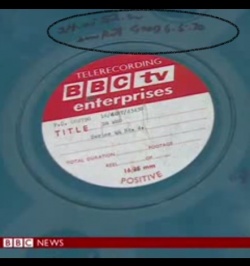
Three stories, 18 episodes:
| NN | The Abominable Snowmen | 6 |
| PP | The Enemy of the World | 6 |
| The Web of Fear | 6 |
According to Phil Morris, these three stories were sold to RKTV. This must have preceded the screenings on BPTV - see below.
This sale of three season five stories to Nigeria was directly linked to the sale to New Zealand under the minor-Commonwealth "quota" -- i.e. the Nigerian TV station could only purchase the same serials that the NZBC had in 1971, which is why the two season five serials not acquired by NZ -- The Ice Warriors and Fury from the Deep -- were also not offered to Nigeria. And with the sales rights to the serials expiring in late 1974, there was a need to get a final minor Commonwealth sale completed before they were withdrawn.
The minor Commonwealth rights on The Wheel in Space had been completed with the sale in 1973 (see above), so only these three Troughton stories needed to be sold before the end of 1975.
The programme was supplied as 16mm black and white film prints with English soundtracks.
*Origin of the Prints
It is clear from the labels and markings on the reels and plastic cans that the film prints for The Enemy of the World and The Web of Fear were the same ones that had been transmitted by RTV in Hong Kong and RTS in Singapore.
The films were sent from Singapore directly, or via the BBC in London.
An alternative is that the films had been sent from Singapore to Gibraltar then on to and Zambia, where the serials had screened in late 1973. The BBC may also have acted as an intermediary between Zambia and Nigeria.
But of note, the only recognisable labels and markings visible on the recovered films cans are for Hong Kong and Singapore, and not any other stations…
Transmission
The serials were purchased by the end of October 1974 (and under the same invoice number; see table above); they would have aired at some point during mid to late 1974.
Issues of the Kaduna newspaper The New Nigerian were checked for all of 1974 and 1975, but there were no specific listings at all for Doctor Who.
However, the printed weekday schedules for TV Kaduna always commenced at 6pm, and the weekend listings commenced at 5pm, so it is entirely possible that the series screened prior to those timeslots, when there were afternoon broadcasts not covered by the newspaper.
The listings do identify the generic "Hello Children" from 6.05 to 6.35pm on weekdays, and the "Sunday half hour" at 5.05 to 5.35pm at the weekend. These same generic headings appear throughout the year (and particularly in the 'clearances' month of October), and any of them could have been for Doctor Who. With potentially as many as 18 listings to cover, that's nearly five months of transmission time.
Since the series aired in the very late slot of 9.15pm when it played on BPTV (below), RKTV can't have done the same as there are no late evening half hour slots with generic titles in the papers.
And depending when in 1974 the broadcasts commenced determines whether or not the screenings extended into 1975. And we know from later events -- see below -- that the screenings had to have concluded by at least April 1975.
*Fate of the Prints
After broadcast, the prints of at least two of the serials -- The Enemy of the World and The Web of Fear -- were sent to the newly-established BPTV in the Benue Plateau, possibly because Jos may have been the 'first' station in the old Northern Nigerian relay network (if such a network existed).
The fate of The Abominable Snowmen is unknown. It most likely also went to BPTV with the others. But since the films were not later found in Jos does offer the possibility that they aired on RKTV only, and weren't sent on.
Episode-hunter Phil Morris has stated that programmes were often bicycled to TV stations in Nigeria as a means of giving them something to screen to keep them on the air, even though they did not purchase the rights to screen them. He specifically refers to tapes, so this practice is unlikely to have been happening with films prior to the involvement of the NTA (see below), since there were so few TV stations in the 60s and early 70s then - only eight, some of which were no more than a year old by 1974 - and they all operated independently, so it's doubtful there was any film-sharing between these new and unconnected state-owned stations.
This practice of tape sharing is likely to be something that was introduced much later in the 1980s and 1990s, by which time there were over 30 NTA stations, all hungry for material to screen. But what RKTV may have done here to help out the new station was to provide them with additional material to broadcast in the first year of operation. So, while these Patrick Troughton stories had been sold by the BBC to RKTV, the sales contract with the BBC may have allowed for this second screening.
TV Listings
| ← AIRDATES ...... (CLICK ICON TO GO TO TABLE SHOWING EPISODE BREAKDOWN AND AIRDATES - N/S = story title is Not Stated) |
The clippings also come from New Nigerian. The schedules for the stations NBC-TV, WNTV, MIDWEST TV (see above) and TV KADUNA / RKTV appeared mostly every day (although sometimes some stations were dropped if there was no room on the page). Listings for both weekend days appeared in the Saturday issue. Listings for all channels on weekdays commenced at 6pm, and weekends at 5pm, so any afternoon programming was not covered.
There were no specific billings for Doctor Who, but as noted above, there were ones for "Children's Hour" or other generic programmes for children. The newspaper was also plagued with 'duplication' of some listings; it was clear the newspaper had just 'cut and paste' the full TV schedules from a previous month's issue, evidenced by one particular "Movie of the Week" and the same two episodes of Thunderbirds appearing over and over again.
All of which means that on the dates Doctor Who did air, it didn't feature in the newspaper because it was on before 5pm/6pm, it was in the "Children's Hour" or "Sunday Half Hour" or that day's listing was a 'duplicate' of a previous day's.
BPTV (1975)
BENUE-PLATEAU TELEVISION CORPORATION (BPTC)
The Benue Plateau region of central Nigeria was originally part of Northern Nigeria, and television during the 1960s and early 1970s came from RKTV in Kaduna. Benue Plateau became a new State in late 1967. For several years, Jos continued as a relay station for the RKTV Kaduna network.
The Benue Plateau Television (BPTV) was launched on 15 June 1974 (on channel 7). This was based in Jos, and replaced the RKTV relay.
The Benue Plateau Broadcasting Corporation (BPBC) was later created to control the region's television and radio services; it was officially inaugurated on 25 February 1975.
In 1975, BPTV became the first TV station to launch regular and permanent colour broadcasts in Africa (colour test transmissions commenced 1 October 1975).
BPTV was re-branded as NTV-Jos Channel 7 in 1976.
In February 2008, the old BPTV station was upgraded to a NTA Zonal Network Centre for what was now called Plateau State. (News report HERE.)
In February 2015, the station subsequently suffered serious damage when a fire ravaged the building:
Stories bought and broadcast
PATRICK TROUGHTON (#3)
No more than three serials, 18 episodes:
| NN | The Abominable Snowmen? | 6 |
| PP | The Enemy of the World | 6 |
| The Web of Fear | 6 |
BPTV acquired at least two of the Patrick Troughton stories (from GROUP D) that had previously aired on RKTV in 1974 (see above).
The programme was supplied as 16mm black and white film prints with English soundtracks.
*Origin of the Prints
The Enemy of the World and The Web of Fear -- and possibly also The Abominable Snowmen -- were sent from Kaduna; RKTV may have sent the films to the newly-launched Jos station because Jos had been part of the RKTV network, and the sales contract with the BBC may still have included Jos in the deal.
Alternatively, RKTV may have just sent the films to its former-relay station to assist it in its first year of independent operation, which may account for what subsequently happened…
But there is no absolute certainty that BPTV got the full set of episodes that had been at RKTV - we do know they received The Enemy of the World and The Web of Fear, since the films were still there 40+ years later. But what of The Abominable Snowmen?
We also don't know for sure in what order they received them. Did they get all the stories sent over in one batch, or were they sent over one by one, story by story, or episode by episode. Did The Enemy of the World arrive before or after The Web of Fear?
As noted below (see Film Make Up Sheet), BPTV had episode 3 of The Enemy of the World in its possession by 6 May 1975 - but how many other episodes did they also have at that time?
Transmission
Although the station's transmissions had commenced in June 1974, TV schedules for BPTV were not published in the local Jos newspaper The Nigeria Standard until April 1975, and so only three airdates for Doctor Who could be documented.
The three available listings show that "Dr Who" aired on Tuesday at 9.15pm, on 15 April, 22 April and 29 April 1975. It's not known therefore if these three were the last of a run of 6, 12, or 18 (or more) episodes. For all we know, they could be episodes one, two and three of a story that was abandoned half way through.
Listings for the rest of 1975 were checked, but there were no further billings for "Dr Who", so it's clear that this is the end of the run.
(It's possible that the series was moved to an earlier timeslot - 9.15pm is after all very late for what is a series for children - and it later played under a generic "Children's programme" heading; BPTV did indeed have a half-hour "Children's Variety" show in April 75.)
With potentially as many as 18 episodes to account for, and if the series ran without interruption, it potentially could have commenced on 31 December 1974.
But of course there is no absolute certainty that all the supplied episodes aired in one continuous run either. There are only three published listings, which really only tells us that half of one serial at least screened!
And it's also possible that BPTV was not permitted to screen the series after all, and the sale to RKTV didn't include BPTV, so further broadcasts were dropped.
And since BPTV switched to colour in October 1975, it's doubtful that 'old' black and white material would have been used after that date.
FILM MAKE UP SHEET
The "Film Make Up Sheet" exists for The Enemy of the World part three. A photo of this document is seen on the 2018 Special Edition DVD; although the story title is not recorded, the sheet says "EP 3" with a duration of "23'.7" which matches the BBC's official running-time for that particular episode.
On the sheet is the date 6/5/75; this is very odd, since that is the week after the TV listings end! Why were the technicians at BPTV "making up" the film on 6 May when the series wasn't scheduled to air that same day? Did they make up the sheet per routine not realising the episode wasn't going to air?
Another possibility is that the films arrived in BPTV on that date, and the films were only being prepped and catalogued without also being scheduled. If that is so, then the three billings could be just for the final half of The Abominable Snowmen.
Of course, if the films never aired, this could certainly explain why the prints were held onto for 40 years! (See below)
An alternative is that this was a post-transmission "make up" step - i.e. after the story had aired, this episode (and presumably all the others) went through the process of having the ad break splices fixed, and this sheet was written up to record when that was done. However, the lack of headings or notations such as "splices", "repairs", as one would expect to be on such a document, is absent.
But to us, based solely on what is on the sheet, it does read to be something that was written up once the films had arrived at BPTV and catalogued into the film library pending scheduling.
But either way, the sheet really doesn't tell us anything about the film other than that it was at BPTV on that date.
TRANSMISSION SUMMARY
Taking all the above into account, the three airdates we have would be one of the following:
- The last three of a 18 episode run (three serials aired)
- The last three of a 12 episode run (only two serials aired)
- The last three of a 6 episode run (only one story aired)
Or
- Parts 3, 4 and 5 of a story dropped from the schedules
- Parts 2, 3 and 4 of a story dropped from the schedules
- Parts 1, 2 and 3 of a story dropped from the schedules
- Part 6, then parts 1 and 2 of a story dropped from the schedules
- Parts 5 and 6, then part 1 of a story dropped from the schedules
The bold option is the one we think might be what happened. If BPTV got The Abominable Snowmen from RKTV, then this would have aired first, then sent elsewhere (which is why it wasn't still in Jos with the others 40 years later).
Part six screened on 29 April. The film for at least The Enemy of the World part 3 arrived on 6 May, and was "made up", but since the serial hadn't been scheduled, all the other films went into storage. The films for The Web of Fear also arrived, and were also put into storage, awaiting scheduling at a later date. But when BPTV switched to colour transmissions from October 1975, the unwanted black and white films sat on the shelf…
*Fate of the Prints
The BPTV retained the films of at least The Enemy of the World and The Web of Fear for a year. When the NTA was established in early 1976, the film prints remained at Jos.
Even when BPTV later became the Zonal Network Centre for what was now the Plateau State in February 2008, the films remained untouched in the film store…
In late 2011, all 12 prints of The Enemy of the World and The Web of Fear (all still in the ex-RTV Hong Kong film cans) were located by Phil Morris at the Jos station. Sadly, the third episode of The Web of Fear disappeared before it could be shipped to the UK. The other 11 films were eventually returned to the BBC in 2013.
(There was no sign of The Abominable Snowmen or The Wheel in Space at Jos. The former may have been moved elsewhere or destroyed after it had been broadcast, and the likely fate of the latter (since RKTV and BPTV never had it to begin with) is covered above.)
The discovery of the episodes even made it to a Nigerian nostalgia forum:
TV Listings
| ← AIRDATES ...... (CLICK ICON TO GO TO TABLE SHOWING EPISODE BREAKDOWN AND AIRDATES - N/S = story title is Not Stated) |
Listings are from the Jos newspaper, The Nigeria Standard. The paper was published on Sundays only, but with TV listings for the full week.
There were no TV listings published prior to the 13 April 1975 issue. Only three billings for "Dr Who" were found – on 15, 22, 29 April 1975. All papers were checked to the end of 1976, and despite regular TV listings appearing, there were no further listings at all for Doctor Who. Therefore, we assume that these listings are for the final three of however many episodes there were that went to air.
UNKNOWN STATION/s (RKTV?) (1975/76)
The next set of Doctor Who serials sold to Nigeria aired … somewhere -- but we don't know where and we don't know when.
Stories bought and broadcast
PATRICK TROUGHTON (#4)
Two stories, nine episodes:
| TT | The Dominators | 5 |
| WW | The Krotons | 4 |
It's not clear if these two stories aired on the same TV station, or on two different stations.
The programmes were supplied as 16mm black and white film prints with English soundtracks.
While the selection of episodes seems random, like the season five serials two years earlier, the BBC was making sure it was using up its minor-Commonwealth "quota" on these two before the screening rights expired in August and December 1975 respectively.
(Why Nigeria - and also Zambia - didn't acquire The Mind Robber or The Invasion at this time may be down to the rights on those two serials expiring before an offer could be made, or perhaps there was no longer a complete set of prints that could be sourced in time (i.e. by then, parts one and four of The Invasion were already "lost" and no longer available.)
It is not known to which station or stations in Nigeria these were sold: BBC Records indicate that royalties for the sale of The Dominators to "Nigeria" (under invoice number 14563) were paid out on 20 November 1975, and for The Krotons (invoice 15670) on 6 February 1976. But there is no certainty that both stories were actually sold to the same station; it could have been to two different stations, months apart.
By the end of 1975, there were nine TV stations operating in Nigeria:
- Western Nigerian Radiovision Service, Ibadan (WNTV) (Western State)
- Radio Kaduna Television, Kaduna (RKTV - see above) (Kaduna)
- Nigerian Broadcasting Corporation, Lagos (NBC) (Lagos)
- Bendel TV (aka MidWest TV - see above), Benin (Bendel)
- Benue Plateau Television, Jos (BPTV - see above) (Benue Plateau)
- East Central Broadcasting Service, Enugu (ECBS) (East Central)
- Eastern Nigerian Television, Aba/Owerri (ENTV) (East Central)
- Rivers State Television, Port Harcourt (RSTV) (Rivers and Cross River)
- North Western Television, Sokoto (Northwestern)
Since RKTV in Kaduna acquired the very first set of Hartnells in the 1960s, and the final batch of season five Patrick Troughtons in 1974, and it was usually also the first station to acquire other BBC programmes, it's reasonable to assume that they also got these two from season six.
BPTV (see above) was preparing to transmit in colour by October 1975, so likely would not have been acquiring further black and white material. Also, newspapers to the end of 1976 were checked and there were no listings at all for Doctor Who that year, so we think it safe to exclude Benue Plateau TV from the list of potential stations.
As we've covered above, the previous sets of sales were all to TV stations that had only recently launched and would be after "cheap" programmes, especially any due to expire.
In terms of the list above, the most recent "new" station to be launched when these two stories were on offer was Sokoto in the Northwestern State (which commenced broadcast on 15 February 1975), and which --- of note -- had previously been the location of a relay station for RKTV. RKTV might have purchased these two stories, then sent them to Sokoto. Unfortunately, we have not been able to locate any newspapers with listings for that TV station.
But on balance, we think these two stories were probably screened on RKTV.
*Origin of the Prints?
Film prints that had originated in Hong Kong and Singapore had previously made their way to Nigeria -- see both above -- so it is very likely that RTS was being used as the go-to supplier for all further film prints required by Nigeria. One or both of these season six serials may have come from that source.
Alternatively, the film prints of one or both of these two serials were supplied from Gibraltar (who may in turn have got them from Singapore!).
Transmission
No specific listings for Doctor Who could be found in any Nigerian newspapers in late 1975 or during 1976. However, as noted above, TV Kaduna / RKTV had several non-descript "Children's Hour" type listings, any one of which could easily have included Doctor Who.
We therefore have no firm idea when and where these nine episodes aired.
*Fate of the Prints?
Nigeria was the final country to purchase and screen these two season six Troughton serials.
The films were retained, returned to the BBC or destroyed.
If the prints were returned soon after broadcast, they may have been the ones that were held by the BBC when the documentary Whose Doctor Who was in production at the end of 1976, and some of them may have been the ones that ended up in Taiwan…)
TV Listings
| ← AIRDATES ...... (CLICK ICON TO GO TO TABLE SHOWING EPISODE BREAKDOWN AND AIRDATES - N/S = story title is Not Stated) |
Many Nigerian newspapers from different regions and cities were checked for 1974, 1975 and 1976, but there no listings found for Doctor Who which makes it difficult to narrow down when and where these episodes screened.
Many papers did not print any TV listings at all, and those that did often only printed one or two stations from time to time, and not always the same ones on a regular basis -- for instance, one paper printed listings for three stations one week, then the following week an entirely different set of stations.
There were however lots of listings for generic and non-descript Children's Programme, which may have included Doctor Who.
MAGIC HOUR - SON OF DR WHO
The Kaduna newspaper New Nigerian did have three unusual listings under NBC-TV for "Magic Hour – Son of Dr. Who", which aired from Sunday, 7 December 1975 until 28 December 1975 (the 14 December paper was missing) but we can be certain that these were definitely not for Doctor Who.
What were they for? See the section on "The Son of Dr Who?" at the foot of this page…
NTV / NTA (1979-1990s)
NIGERIAN TELEVISION (NTV)
NIGERIAN TELEVISION AUTHORITY (NTA)
In early 1976, soon after the creation of the 19 new borders, the Federal government in Lagos annexed the State television system, with plans to amalgamate them all under one controlling body and to introduce a fully networked system.
As a test, the first networked programme was telecast via satellite from NBC-TV in Lagos on 1 April 1976.
The State TV stations began using new call-signs from 8 April 1976 - each station had the new pre-fix ident NTV.
In May 1977, the Nigerian Television Authority (NTA) was formally inaugurated in Lagos to administer all the existing NTV stations, and to establish additional stations so all 19 States had their own local television provider.
THE SIX NTA ZONES
The NTA created six television Zones, each made up of three or four NTV stations (some of which also had relay stations). Although each continued to broadcast its own separate schedules of programming, limited networking of news and educational programmes to the whole country was soon possible via satellite.
The six Zones are as follows (with the first station listed being the network 'production centre' of each). Although each channel was part of a control Zone, the signals they received extended beyond that Zone and into others.
ZONE A
- NTV-Ibadan (Channels 3,4,5,7) (formerly WNBC/WNTV)
- NTV-Abeokuta (Channel 12) (launched after October 1979)
- NTV-Ikeja (Channel 7)
ZONE B
- NTV-Benin (Channel 7) (formerly MidWest TV / Bendel TV)
- NTV-Aba/Owerri (Channel 6) (formerly part of ENTV)
- NTV-Port Harcourt (Channel 10) (formerly River State TV)
- NTV-Akure (Channel 11) (launched in colour circa 1980)
ZONE C
- NTV-Enugu (Channel 2) (formerly part of ENTV)
- NTV-Makurdi (Channel 10) (launched 15 August 1977)
- NTV-Calabar (Channel 9) (launched 19 November 1978)
ZONE D
- NTV-Kaduna (Channel 4,6) (formerly RKTV)
- NTV-Jos (Channel 7; formerly BPTV)
- NTV-Kano (Channel 5,7,8) (launched colour service on 17 October 1976)
ZONE E
- NTV-Maiduguri (Channel 10) (launched 15 January 1977)
- NTV-Bauchi (Channel 9) (launched February 1977)
- NTV-Yola (Channel 8) (launched in June 1978)
ZONE F
- NTV-Sokoto (Channel 3,5,9) (formerly NWT)
- NTV-Ilorin (Channel 6) (launched 20 October 1977)
- NTV-Minna (Channel 10) (launched 12 October 1978)
A second Lagos channel was also created, and the two operated as a separate Federal District "Zone". NTV-Lagos was the national network channel, available in most parts of the country via satellite link up.
- NTV-Lagos (Channel 10; formerly NBC-TV)
- NTA2-Lagos (Channel 5) (launched in 1980)
Colour broadcasts had commenced in Nigeria on BPTV in 1975, and all the NTV stations were converted to PAL colour in due course, although most viewers still only had black and white sets.
When the regions of Nigeria were divided again in the late 1990s, creating over 36 new States, each eventually had its own TV service as well as carrying the network from Lagos.
Two further Zones were established - there was Makurdi; and in 2008, what had been NTV-Jos became the Zonal Network Centre for the Plateau State. The stations all adopted the new prefix NTA.
By 2014, there were over 100 NTA stations in State capitals and towns across Nigeria. These were administered from the nine Zonal Network Centres: Benin, Enugu, Ibadan, Jos, Kaduna, Lagos, Maiduguri, Makurdi and Sokoto.
Doctor Who on NTV
When Doctor Who returned to Nigerian TV screens in the late 1970s, it screened on a number of (if not all) the NTA stations listed above. Some of the stations may even have continued to repeat the series well into the 1990s.
The entire Jon Pertwee era was skipped (although see note below about Day of the Daleks), and instead viewers saw Tom Baker's fourth Doctor.
Although The Eighties reports a sale of only four stories up to 1987, it is clear from the airdates that far more stories aired. Other BBC Records indicate that the first four stories were Robot, The Ark in Space, The Sontaran Experiment, and Revenge of the Cybermen, sold by September 1978.
(Our thoughts here are that the BBC records used to compile the 1987 list were incomplete, and only sales to Nigeria to the end of 1978 (i.e. the first four stories) were documented. The remaining sales occurred after 1978, and thus are not recorded.)
As far as can be determined, NTV screened Tom Baker's first three seasons only:
Stories bought and broadcast
TOM BAKER
17 stories?, 72 episodes?
| 4A | Robot | 4 |
| 4C | The Ark in Space | 4 |
| 4B | The Sontaran Experiment | 2 |
| 4E | Genesis of the Daleks | 6 |
| 4D | Revenge of the Cybermen | 4 |
| 4F | Terror of the Zygons | 4 |
| 4H | Planet of Evil | 4 |
| 4G | Pyramids of Mars | 4 |
| 4J | The Android Invasion | 4 |
| 4K | The Brain of Morbius | 4 |
| 4L | The Seeds of Doom | 6 |
| 4M | The Masque of Mandragora | 4 |
| 4N | The Hand of Fear | 4 |
| 4P | The Deadly Assassin | 4 |
| 4Q | The Face of Evil | 4 |
| 4R | The Robots of Death | 4 |
| 4S | The Talons of Weng-Chiang | 6 |
The NTV stations therefore would have bought GROUPs A to C of the Tom Baker stories.
The episodes would have been supplied on PAL colour video tapes (most likely U-Matic), with English soundtracks.
Copies of the tapes were bicycled around all the various State stations as required.
Regional Transmissions
The Tom Baker stories aired on various NTV stations on a regional basis, in two separate runs.
The first was in the late 1970s / early 1980s, with a second in the late 80s / early 90s.
Since there were seven Zones to begin with, there is a good chance that these episodes aired seven times each, with the possibility of repeats in some Zones years later.
1970/80s
NTV–KANO (Zone D)
Kano State is in the central Northern-most part of the country. NTV–Kano (channel 5) is the only station for which we have (so far) found published TV listings in the early 1980s.
As far as we can tell, the first episode on NTV-Kano was on Monday, 8 January 1979. (We are unsure as to the exact start date, as there was no listing for the NTV-Kano channel in the 1 January paper.)
The series screened weekly at 6.30pm. The run lasted for 72 weeks, from 8 January 1979 to 19 May 1980. For 11 dates during the run, something else was listed in that slot. But the billings for "Marine Biology", "Young World", "Komai da Ruwanka" (*) and "A Gani Na" (*) may be symptomatic of the duplication errors that affected the New Nigerian back in 1974.
(*) These two programmes are in Chadic, a language spoken in Ghana and Nigeria; the former literally translates as "Get Your Money" and the latter as "Learn More". A Gani Na is listed in the 6.30pm slot through until the end of August 1980.
The fact that 72 is also the same episode-count for Robot to The Talons of Weng-Chiang does suggest that these were the only stories that aired.
NTA2 – LAGOS
NTA2 was the second of the two channels operating from Lagos; it commenced broadcasts on Channel 5 in 1980.
Doctor Who - paired with Rentaghost - aired on the station. For some of this run, it was on at 4pm, which appears to have been when broadcasting started for the day.
We don't have any TV listings for these screenings, but did find a number of generic references online:
- This TWEET says "Dr. Who and Voltron is the first children programme on NTA 2 by 4pm".
- In this BLOG, the writer lists the series that aired on NTA2, including Doctor Who. The writer says transmissions commenced at 4pm.
- This TWEET from 2013 says "you can't remember Dr. Who and forget rent-a-ghost; they always followed each other on Nta2".
- This TWEET from May 2013, refers to Tom Baker on "NTA 2 Channel 5".
- This TWEET says "You used to watch Dr Who on NTA 2 Channel 5 too?"
- This INSTAGRAM posting from 2017 says "[Tom Baker] was the face of dr who on NTA2 channel 5".
- This TWEET from 2013, says "I watched a lot of #DoctorWho in pry sch [primary school] on NTA2 … That Doctor had curly hair and was tall."
- This TWEET from 2011, says "Dr Who on NTA 2 Channel 5!"
- This ARTICLE says "Dr Who [was] on NTA 2 Channel 5...".
- This POSTING on a Nigerian Forum says the series "was shown on NTA2 Channel 5 as recently as the late 1990s"… and "in the late 80's up to early 90's" [but see below]
Other NTV Stations?
Other non-specific references to 1970s and 80s screenings in Nigeria have been found online; some of these might actually be for NTA2:
- This TWEETER in October 2010 asks if anyone "grew up watching Dr Who in Naija".
- And this FORUM contains several posts about the series.
- Several posters HERE recall seeing the Daleks (likely Genesis of the Daleks), The Ark in Space, Pyramids of Mars and The Brain of Morbius in the 1980s.
- Further down the same thread, THIS POSTER says Day of the Daleks was a frequently-repeated serial, and yet BBC Records do not report a sale of that or any other Jon Pertwee story to Nigeria (and there are certainly not enough airdates in the Kano listings above to support any such additional screenings). It's likely they actually mean Genesis of the Daleks.
- The local NTV station for Benin City in the Bendel State still had a generic weekday listing for "Children's Time" - just as it had done back in 1973 when the station was called MidWest TV (see above); but similar listings also naming Doctor Who could not be found.
1980s/90s
NTA – LAGOS
By the end of the 1980s, viewers in Lagos had four TV stations to choose from: NTA Channel 10, NTA2 Channel 5, NTA Channel 7 (from Bendel state) and the non-NTA independent station Lagos Television (LTV) Channel 8.
Doctor Who (the newspapers called it "The Adventures of Dr Who") was back in Lagos, but this time screening on the other NTA station - Channel 10 - from 5pm to 5.30pm on Sundays.
This run may be considered as a "repeat", since the series had previously aired out of Lagos in the 70/80s, albeit on Channel 5, as noted above.
The exact start and end dates of this run are unknown (newspapers or TV listings are not available for the full year), but the series was playing during October to December 1989, and likely also on into 1990.
There are several generic references to these late 1980s Sunday screenings found online:
- According to THIS REPORTER, the series aired on a station "in Lagos … in the late 80s and 90s". [Although she doesn't identify which Lagos station this was, it's highly likely she is referring to NTA Channel 10.]
- In a comment posted on THIS BLOG, the writer recalls seeing the series "on Sunday evening at 6pm" on a black and white TV [although this might also refer to the late 70s screenings above]
- Similarly, THIS WRITER, recalls "watching Doctor Who every Sunday" [likewise, this might be a reference to the 70s/80s screenings]
- This BLOG says "state TV stations in Nigeria back in the day played those early seasons of Tom Baker as Dr. Who over and over again all through the late 80s and probably into the 90s. Ask many Nigerian, Tom Baker (Dr. Who from '74 - '81) is the one and only Dr. Who."
NTV–ILORIN (Zone F)?
All of Season 12 of the series (at least) was available in Ilorin "around 1989 or so", as THIS FORUM POSTER recalls.
Ilorin is just north of Lagos, and both NTA and NTA2 would have been available there, so rather than being on NTV-Ilorin itself, it's possible this was actually a reference to the Lagos channels.
These various online comments indicate that not only did the series cycle around the various NTV stations in the late 1970s and 1980s, but that some were also regularly repeated for many years until the early 1990s.
Of significant note, none of the forum posters quoted above mention seeing any of the Troughton episodes in the mid-1980s … see section below …
TV Listings
| ← AIRDATES ...... (CLICK ICON TO GO TO TABLE SHOWING EPISODE BREAKDOWN AND AIRDATES - N/S = story title is Not Stated) |
The 1979-1980 NTV-Kano listings are from the New Nigerian. All billings are given as "Dr Who". There was no listing for NTV-Kano in the 1 January 1979 paper, so it's possible the series commenced earlier than 8 January.
The 1989 to 1990 NTA Channel 10 details are from the Lagos Sunday Times. Several issues were missing, so we haven't been able to determine the exact start date or how many episodes were shown.
Regular TV listings didn't appear in the paper until 1 October 1989, and did so in two formats: either a full schedule with start times for the four stations (three NTA stations (Channels 5, 7 and 10) and the independents LTV Channel) or as a text summary of highlights.
The first listing in the 1 October 1989 paper has "The Adventures of Dr Who" on at 1pm, and no listings at all between 5pm and 8pm.The following week, the series is on at 5pm with other programming at 1pm, so it's likely the 1 October schedules have been printed with the wrong times.
Most of the November and December issues just have a text summary rather than full schedule with timeslots; the 3 December issue at least records that the timeslot was still 5pm.
NIGERIA - TRANSMISSION SUMMARY
Although the BBC records sales of Doctor Who to "Nigeria", there was never a stage where the whole country saw the same episodes at the same time, with all five known screening periods taking place on a regional basis:
- RKTV (1965-67): 81 episodes; all of seasons one and two, 17 William Hartnell stories
- MidWest (1973): 20 episodes, being the final "Commonwealth quota" sale of three expiring Hartnell stories (from seasons two and three), and one Troughton (from season five)
- RKTV / BPTV (1974-75): 18 episodes; the final "Commonwealth quota" sale of three expiring Troughton 6-parters from season five (all shown on RKTV, only some on BPTV?)
- Unknown (RKTV?) (1975/76?): 9 episodes; the final "Commonwealth quota" sale of two expiring Troughton stories from season six
- NTA/NTV (1979-1990s?): 72 episodes; all of Seasons 12 to 15, 17 Tom Baker stories, shown multiple times (including repeats?) on a regional basis (by all seven Zones?) over a 10-12 year period
FURTHER TROUGHTONS? (1980s?)
It was a Radio 2 interview in early 1984 that was ultimately responsible for the recovery of the episodes that had aired on MidWest TV and/or NBC in 1973: The Web Planet, The Time Meddler and The War Machines -- see above…
This may have been during Terry Wogan's week-day morning show, which ran from 7.30-10am, although there were several other regular "char show" programmes throughout the day.
The films were tracked down to a storage facility, and arrangements made to have them returned to the BBC, but complications circa July delayed their return.
The discovery was reported in the September 1984 issue of the fanzine DWBulletin (DWB) (#14), which said:
- "What sparked it off was an interview on a Radio 2 magazine programme with a technician (from this country) who is involved in setting up a satellite education / communications system to Nigeria. It was he who revealed how backward Nigerian TV was, being all black-and-white with the most recent DR WHOs (as a comparison with our network) being those with Troughton in. Steve Bryant checked up on this and indeed the BBC did purchase the Troughtons years ago."
This last point is very important; we now know that several different stations in Nigeria aired various Troughtons during the 1970s, but that distinction was not known to anyone at that time. We are not told where in Nigeria the technician had been, but it would presumably have been NTA in Lagos.
The quote from DWB also says "indeed the BBC did purchase the Troughtons". This is clearly a typo: but what is the error? Should it be "indeed the BBC did sell the Troughtons" or "indeed the [initials of a Nigerian station] did purchase the Troughtons". Is BBC a mistake; is the name of the Nigerian station that DWB is referring to but mistyped as "BBC" supposed to be the NBC?
Also, Nigerian TV wasn't necessarily that backward; as we've noted above, Tom Baker episodes were airing in colour in syndication in various states at that time. If anything, what the technician was meaning by "backward" was that despite them having colour transmission capabilities those Nigerians with TVs still had black and white sets.
In the following issue of DWB (#15, October 1984), the news story was expanded upon:
- "… [it was] a Radio 2 broadcast concerning the setting up of educational satellite TV in Africa. During the interview, the relative state of Nigerian TV and our own was made by a comparison of the two countries DOCTOR WHO output; theirs being all black-and-white and featuring a Doctor thought to be Patrick Troughton."
But note that it was here stated it was now "thought to be Patrick Troughton", which shows that there was still clearly a degree of uncertainty as to what the technician had supposedly seen.
And to add even more confusion, ex-BBC archivist Steve Bryant told Stage & Television Today (in the 4 July 1991 edition) that "a Radio One DJ had been there [to Nigeria] and joked that they're so far behind there that Dr Who is still William Hartnell. The fans jumped on it, we got in touch with the Nigerian Broadcasting Authority, they tracked it down and we got two complete stories, including The War Machines".
It's clear from Bryant's comments here (even if he is slightly off the track with his belief that it was Hartnell, and a Radio One DJ who had made the claim) that he considered what the "DJ" [sic] had said was done so in jest, rather than as a statement of fact.
There are no further sales of 1960s' Doctor Who to Nigeria noted in any BBC records beyond the final two season 6 serials in 1976. The rights to all the Troughtons stories had expired by mid-1976 anyway.
There is a very remote possibility that further screenings of Troughton episodes took place in Nigeria but they were repeats (either paid for or unpaid for) of stories bought already than of additional stories acquired from somewhere illicitly.
Taking all this on board what the technician meant was either:
- a) Patrick Troughton stories did air in Nigeria during the early 1980s, and were likely to be repeats of the stories that had already aired (as detailed above), or were of other season 4, 5 or 6 serials but which are not for some reason recorded in any BBC sales documentation
- b) he is mistaken, and what he saw was actually the Tom Baker serials shown on NTA stations in late 70s/early 80s on a black and white set (and who he thought was Troughton was a guest actor in one of the Baker serials?)
- The very fact that as we noted earlier none of the posters in the forums linked to above mention seeing Troughton in the 80s does suggest the technician wasn't necessarily telling the complete truth
- c) he didn't actually see any episodes at all and was merely using Doctor Who and Patrick Troughton as an off-the-cuff jest to press the point that most Nigerians still had black and white televisions
Unless a copy of this 1984 Radio 2 interview surfaces, we will never know precisely what was said nor the context in which it was said.
On balance, we think the technician did see Doctor Who on black and white TV when he visited Nigeria, but it was Tom Baker, not Patrick Troughton…
The Son of Dr. Who?
On 7 December, 21 December and 28 December 1975, the New Nigerian newspaper had listings for "Magic Hour – Son of Dr. Who", from 4pm to 5pm for the station NBC-TV.
Initially, it was thought that these might have been billings (albeit highly unusual ones) for the final run of Patrick Troughton stories The Dominators and The Krotons (see above), but subsequent research has revealed that "Son of Dr Who?" has nothing to do with Doctor Who at all. However, the story behind this billing is quite fascinating…
WHO IS 'THE SON OF DR. WHO?'?
"The Son of Dr Who?" (and yes, the question mark is deliberate) was the later-adopted stage name of one Olajire Shotolu, a popular magician and occultist based in Lagos.
Shotolu was born on 8 December 1941, the son of professional magician "Professor Who?" (and yes, this question mark is also part of that name!), also known by the Nigerian name Osho Magic. Like his father, Shotolu took up magic at a young age, performing sleight of hand tricks for his school friends.
The young boy also took a keen interest in palmistry, astrology, hypnosis, and occult spirit manifestation, reading books on these subjects owned by his father. The Professor, however, was not keen for his son to follow in his footsteps, and wanted him to get a higher education.
But in 1962 (aged 21), Shotolu quit his college studies and took up a government job, but still practiced magic as a hobby, performing shows at clubs and hotels in the evenings. Deciding to pursue a career as a doctor, he left Nigeria to study medicine in Italy. While there, he met and married his wife, but study did not appeal, so the family moved to England – where he lived for the next 11 years.
While in London working in a factory, he became a member of the Magic Circle, and befriended other local magicians. Within a very short time, he started performing in the UK, with his specialty being a fire act and traditional Nigerian 'magic' known as Igunnu (based on traditions native to the Tapa tribe of Nigeria).
In 1964 he performed on stage at the London Palladium as a guest of Sammy Davis Jr, who had a five-week long act at the venue (see Sammy Davis Jr Salutes), and at some point during the late 1960s, he guested on a BBC programme recorded in Bristol. (The identity of this programme is unknown, but may have been "Tom Tom", the Bristol-based "magazine show" which ran from 12 October 1965 until 4 November 1970. And indeed, on 27 May 1969, in his final appearance as its long-running host, Jeremy Carrad made his exit via a magician's disappearing cabinet; not that this was necessarily Shotolu!)
In 1971, Shotolou's life took a bad turn when he was jailed for three years on narcotics charges. (During his time away, his father, Professor Who?, died, and his wife left him.) Upon his release in 1974, he returned to Nigeria.
Back home, he resumed his passion for magic, and soon started appearing at night clubs and hotels, gaining a reputation with a "sawing his partner in half routine". It was during this time that he adopted the stage name "The Son of Dr Who?", which was suggested to him by his producer as an homage to his late father, Professor Who?, and also in recognition of his desire to be a doctor.
(It is, of course, possible that his producer was aware of the television programme with the same name -- the series may have aired on NBC-TV in 1973 (see above) -- and she took it for inspiration.)
Within a short time he was offered his own television show, which ran for four years -- which is where those "Magic Hour – Son of Dr. Who" listings from 1975 enter the narrative.
Shotolu performed on Nigerian television with other magicians such as Professor Peller (from Nairobi, Kenya) and Dr Ogboni. (In his online biography, Dr. Oluaiye Mobolaji Alimi Salami Naibi Oba Ogboni, reports that he studied magic in London, and on returning to Nigeria became "the in-house magician performing on NTA Channel 10 with [the] late Professor Peller and son of Dr. Who between 1976 – 1978.") [NTA Channel 10 was the post-1976 identity for what had previously been NBC-TV!].
"The Son of Dr Who?" also practiced as an "Occultist Spiritualist", selling talismans and charms. (One of his print advertisements was published in a 1979 African publication called "Drum".)
As a result of his popular TV appearances, "The Son of Dr Who?" toured the northern states of Nigeria, which earned him a considerable fortune. With his new wealth he bought his own venue, The Top Hat Hotel in the Alapere-Ketu suburb of Lagos. Shotolu also remarried, and had four daughters.
It is not known whether "The Son of Dr Who?" is still alive (he would be in his late 70s now), and still performing (The Top Hat Hotel building may still be standing, but it is no longer a night club), but there is a placeholder Facebook page for a "public figure" in Lagos under that unusual name.
So, despite his having a similar name, there is no direct connection at all between "The Son of Dr Who?" and the other Doctor Who.
There is also an unrelated travel agent in Lagos called "Dr Who's Consulting". Do they do time travel…?
[With grateful thanks to Geoff Hansen for the biographical information about and photo of the Son of Dr Who?!]
Nigeria in Doctor Who
- Gravitron Moonbase crewman Ralph deBayo (played by Mark Heath) wears a Nigerian flag on his tunic (The Moonbase).
- One of the BBC Library 'stock' music-tracks was used in The Faceless Ones was called "Nigerian Drums".
- The African diplomat at the World Peace Conference appears to be wearing traditional Nigerian attire (Day of the Daleks).
